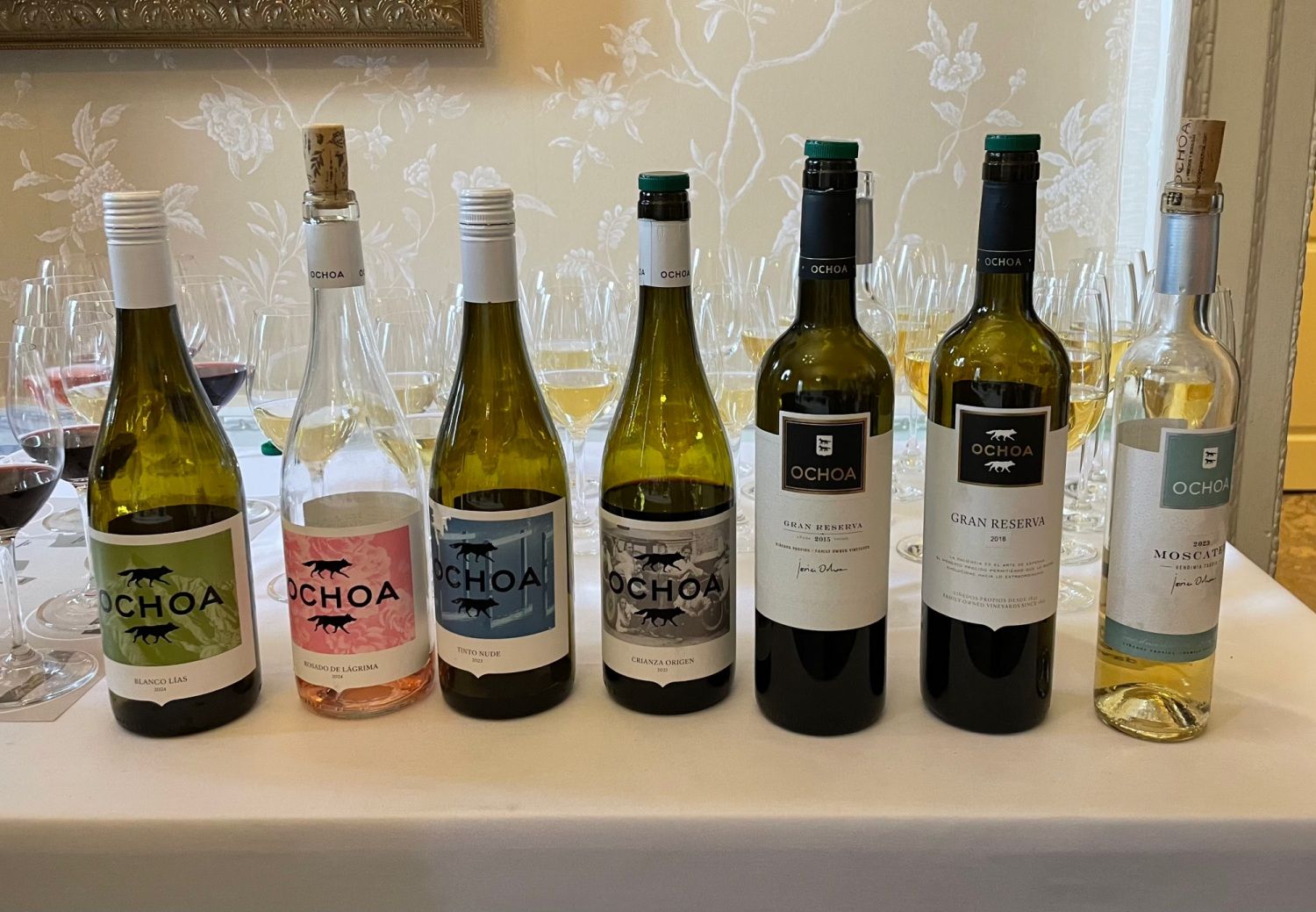You can follow the industry’s immediate response to Covid-19 in our first Covid-19 Hub here and then all the initiatives and actions taken by drinks companies, producers and the hospitality sectors in April with our second Covid-19 Hub.
The Buyer’s Covid-19 rolling hub has been selected as one of the best in the country amongst specialist business media by the UK Press Gazette, the industry bible for journalists, in its Coronavirus Excellence Journalism initiative.
May 27
Bruce Jack on the challenges – and opportunities – for South Africa and the global wine industry
South African wine producer Bruce Jack has always had the capacity to think and act differently from so many of his peers. A true, passionate winemaker at heart, Jack is also hard wired into the commercial realities of wine, drilled and shaped during his time at Flagstone Wines, Constellation and Accolade Wines and now with his own branded wine business Bruce Jack Wines.
If you really want to get ahead and see where the world of wine is going then he is one of the first people you need to be listening to – or in this case watching too. Here is a fascinating and, at times, emotional interview with Jack I did for VINEX, the global trading site for bulk and bottled wine wine. In it he explains what it has been really like as a major South African wine producer trying to cope, or somehow scrape a living in the country’s severe lockdown that has banned the sale of any wine domestically, and only recently lifted the ban on exports too.
He fears the restrictions could have long standing ramifications for the country’s wine industry – with up to a 100 farms potentially at risk. But he also shares the industry’s overwhelming thanks to the support it has received from the international wine community – particularly from the UK – where he says he has been bowled over by the steps taken by major buyers to help South African producers at this time. He says it certainly won’t be forgotten.
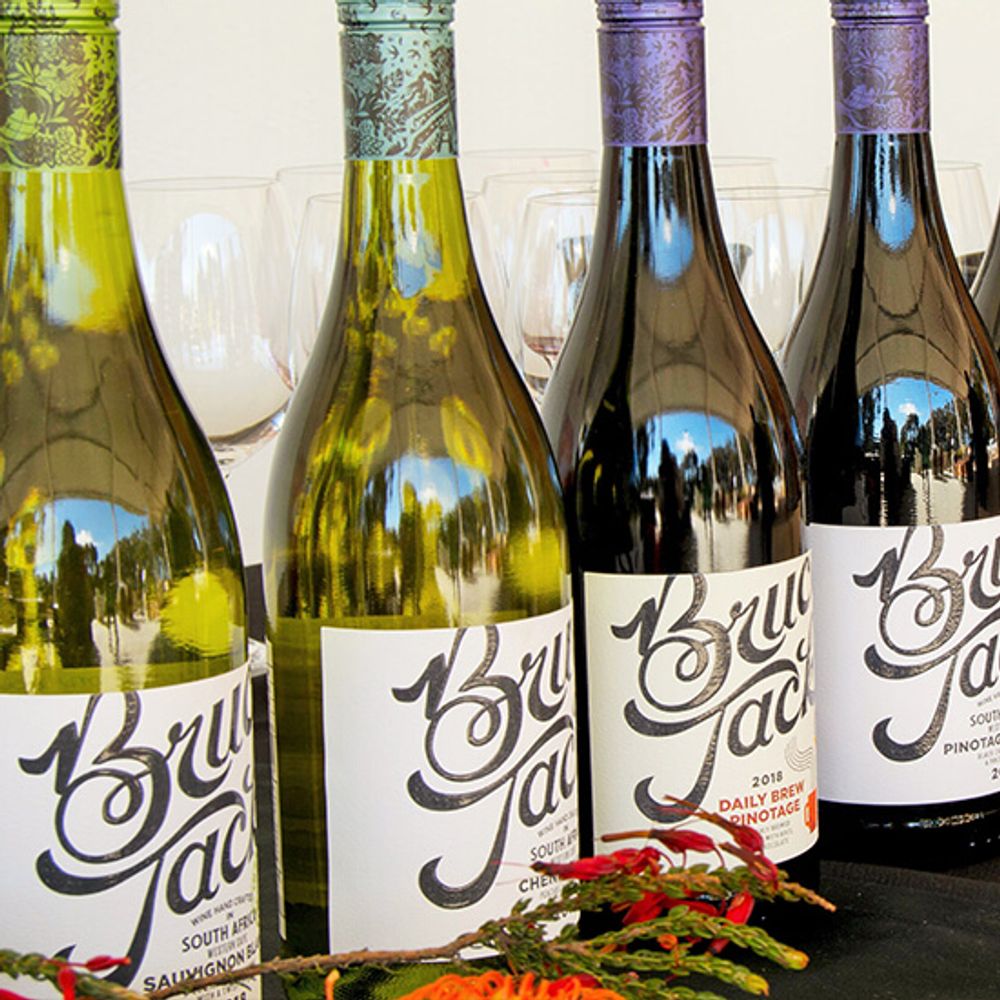
Working collaboratively around the world enables Bruce Jack to source the best quality wine he needs but at the price points he needs to hit
Jack also explains, in depth, the collaborative and innovative way he works with producers around the world to source, supply and be an overall partner in his Bruce Jack branded wine business. So rather than follow the traditional route of buying grapes or blending wine with a producer on a contract basis, Jack has forged true partnerships with his producers and wine partners, including UniWines in South Africa and Valle Secreto in Chile.
Because they too benefit from any profits and revenues he believes it means they are all working in true partnerships with common goals and ambitions. By working in this way he believes it is also the most effective way to build scale and distribution in all the key markets he wants to be in around the world. It is also an approach he hopes others will follow, particularly in wake of Covid-19, where producers, distributors and buyers alike can all build on the inspiring collaborative steps that have already taken place as a collective wine industry.
If you have 40 minutes to spare it really is worth hearing Jack’s philosophy and take on the future of the wine industry.
- Bruce Jack is also helping to run and raise money for a soup kitchen as part of this Headstart Trust charity that has had had to be set up in his local wine region of Napier as vulnerable local communities have been caught up in the lockdown resulting in dire food shortages and real poverty. If you wanted to donate any money to help him and his team continue with the food bank then you can donate here.

Local children queuing for food at the Headstart Trust soup kitchen
100-day recovery and relaunch ‘Playbook’ launched
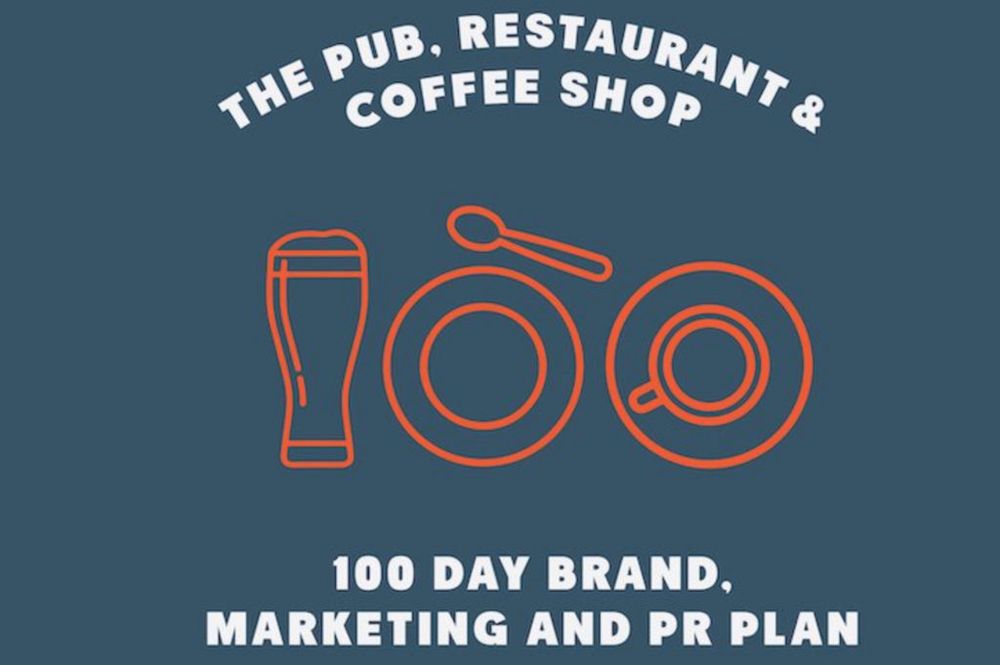
A new guide has been produced by a number of stakeholders with on-trade and consumer experience to help the on-trade bounce back
A new guide has been produced by a range of marketing, hospitality, branding and PR experts to help give on-trade owners what they are calling their “100 Day Marketing and PR Plan” to help businesses not just get back into business, but grow and shine when they do. In return the companies behind the initiative are calling on individuals to donate £50 and businesses £250 to Hospitality Action.
Those behind the guide say: “Our aim is simple; we’ve created this agency collective to be able to come together to share our expertise in brand, marketing, PR, digital, and social media, to help bring back the hospitality sector. Whether you’re an owner or a manager, a single site or a nationwide chain, this guide is designed to help get businesses back on their feet and trading again.”
It has been produced by KAM Media, Fleet Street Communications, Me:mo, Smithfield Planning for Performance, 2 Forks, Feed it Back, Datahawks, Bum on Seats, Wireless Social and Nomad. If you want any more information then email 100dayplaybook@gmail.com.
Flint Wines hosts Future of UK Hospitality debate with top restaurateurs and Master Sommeliers
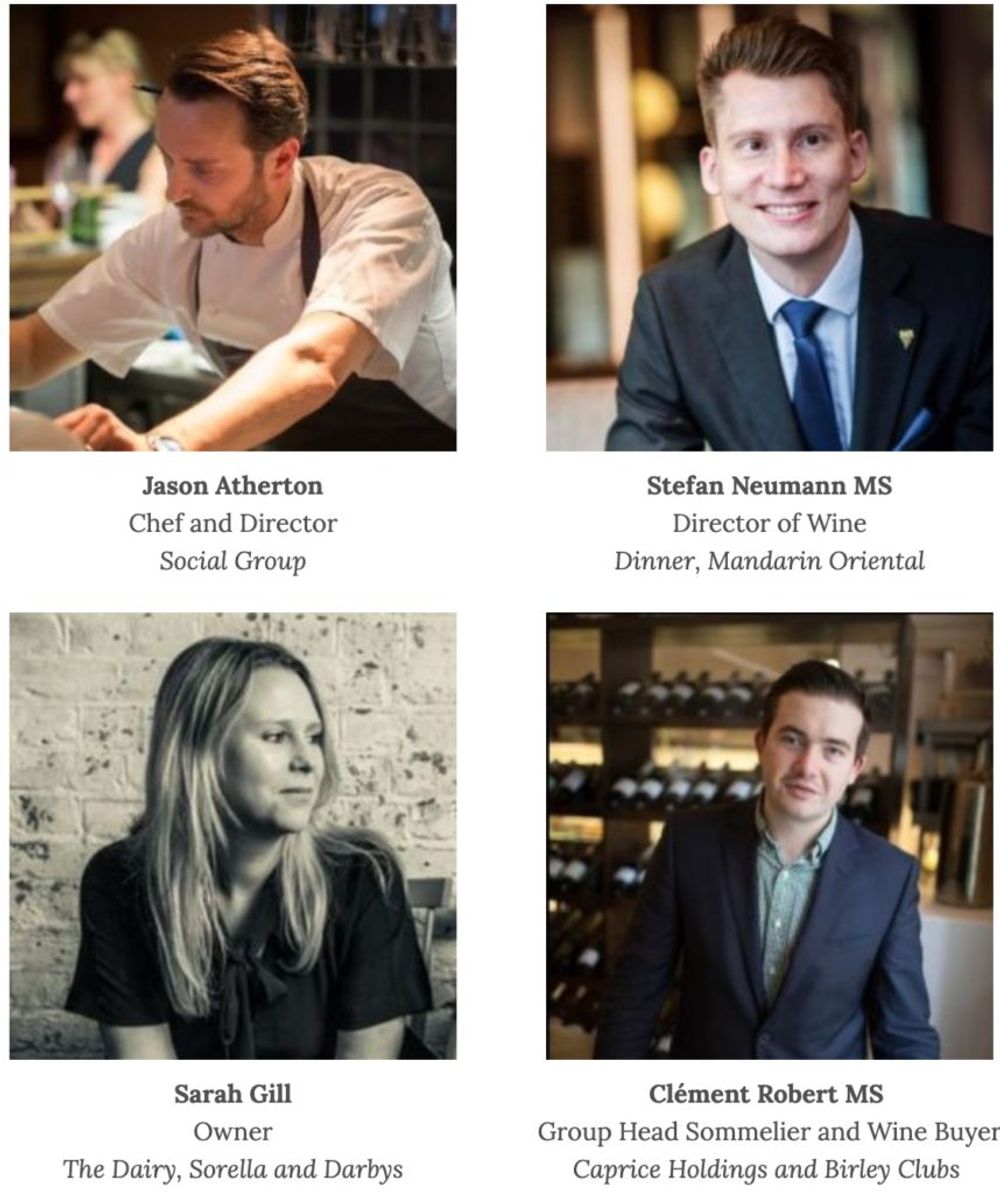
This looks like it could be worth an hour of zoom time. Flint Wines is hosting a debate at 3pm on Future of UK Hospitality hosted by Gearoid Devaney MS with restaurateur, JasonAtherton, Sarah Gill, owner of The Dairy in Clapham, Clement Robert MS, group head sommelier and wine buyer of Caprice Holdings and Birley Clubs and Stefan Neumann MS of Dinner by Heston Blumenthal. To watch then click here.
May 26
Kantar: rise of both global and local brands will be big winners post Covid-19
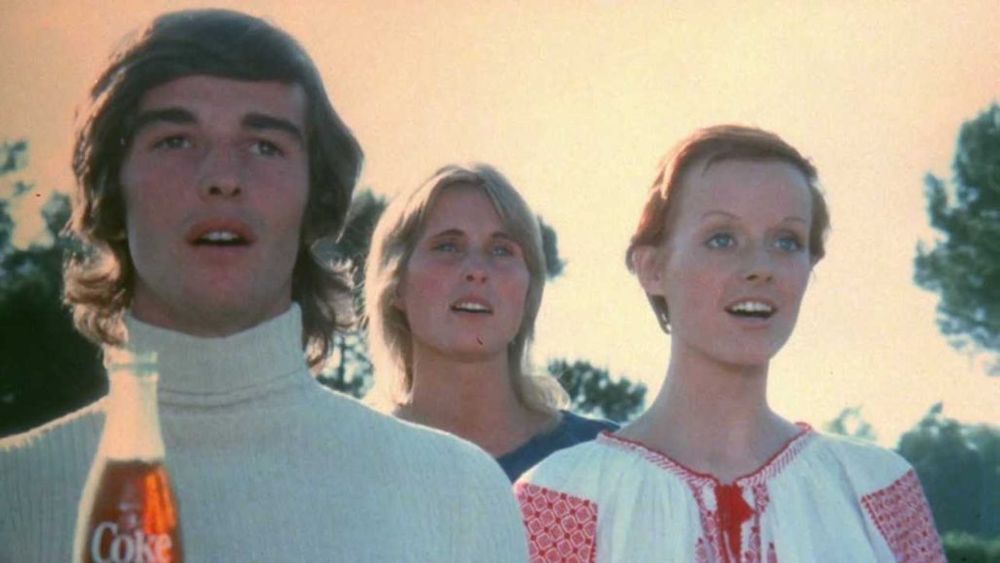
Coca-Cola is still the best at getting the world to sign along to its tune
The latest analysis from Kantar into our relationships with brands identifies two key trends:
- we are more and more living in the age of the super brand where a smaller number of giant brand super powers own more of the household brands we are buying in our millions around the world. It says there are now seven global brands (top two are Coca-Cola and Colgate) that were chosen from a retail shelf over one billion times in 2018 and are part of what it calls a ‘billionaire club’.
- conversely we are also living in a time when ‘local’ is becoming the preferred option for when consumers are looking to buy goods, products and services outside of their main shopping needs. The outbreak of Covid-19 around the world has simply accelerated a trend that was already embedded with consumers – to support your best local, craft and artisan producers and suppliers.
- Local brands saw an increase in the number of times they are chosen by consumers with its share rising to 64.8% versus global brands’ 35.2%
Its analysis of the Top 50 global FMCG brands shows that 20 of the top 25 also saw growth in the last year, stretching to 31 of the top 50.
Our shopping habits during Covid-19 are now becoming clearer, claims Kantar:
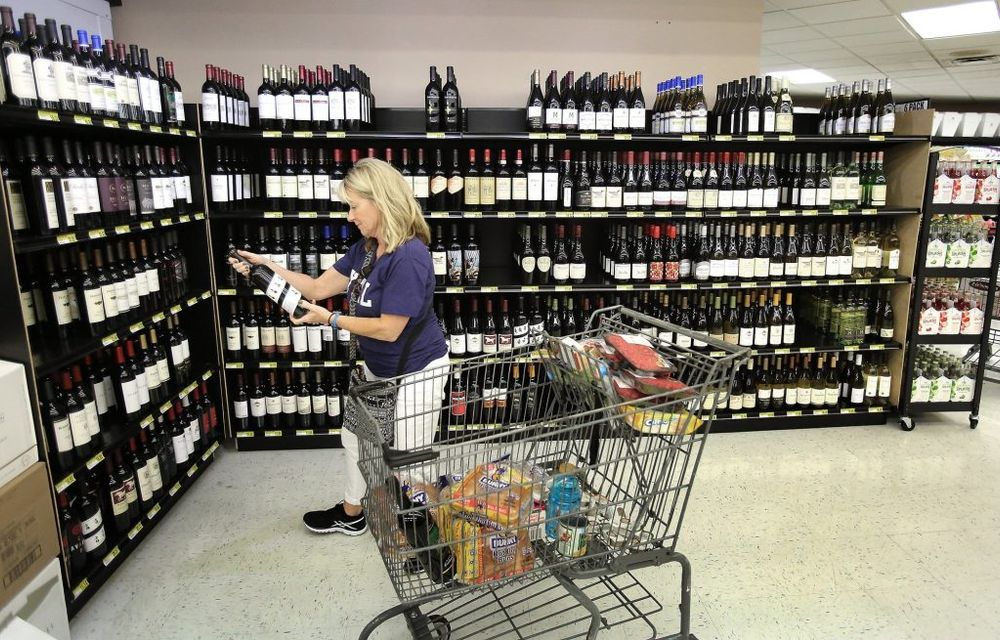
Shoppers are going to the supermarket less often, but still stocking up when they do and preferring to shop locally more often as well as do deliveries
- People are shopping less often, whilst buying more per visit.
- Digital has not only boomed, but it has levelled the playing field far more for good, independent e-commerce players to compete head on with the big stores and multiple retailers, with the ability to deliver quickly and conveniently being the real point of difference.
- The squeeze on spending is starting, with consumers increasingly worried about future salaries, and job security, but even then the FMCG sector should remain ‘resilient’.
Kantar also reveals the categories that are doing the best during Covid-19 are the ones that were in growth before hand. Brands are five times more likely to be growing if the category in which they play is growing. This has become even more important during the pandemic, says Kantar. But it also stressed that some of the big changes we are seeing now – rise in household cleaners and decline in health and beauty – will quickly unravel when we come out of lockdown.
As it explains: “It’s important to remember the category patterns displayed here are strictly related to lockdown. New patterns will arise as long-term changes are revealed.”
The question is which ones will stick. It adds: “We have probably never seen so many people trying something new, whether it’s a new retail channel, new routines (whether in cooking, eating or personal care), or new brands. What we need to do is observe and understand how many, if any, of these behaviours will stick as restrictions are lifted.”
The brands and categories best placed to come out of the crisis are well are those that can:
- add more variants to a brand to attract a wider customer base.
- be first to market with a new category brand that matches a consumer need.
- people buy brands to suit occasions so brands that can sit across different occasions and moments will do well, particularly those can create new formats and flavours to do so. Which is good news for beers, wines and spirits.
- be more multi channel. The explosion in delivery and e-commerce means brands need to find new formats to suit different channels and buying needs. It’s also the way consumers will see your brand more often in different shopping occasions.
Three cheers to Three Cheers and its local food donation scheme
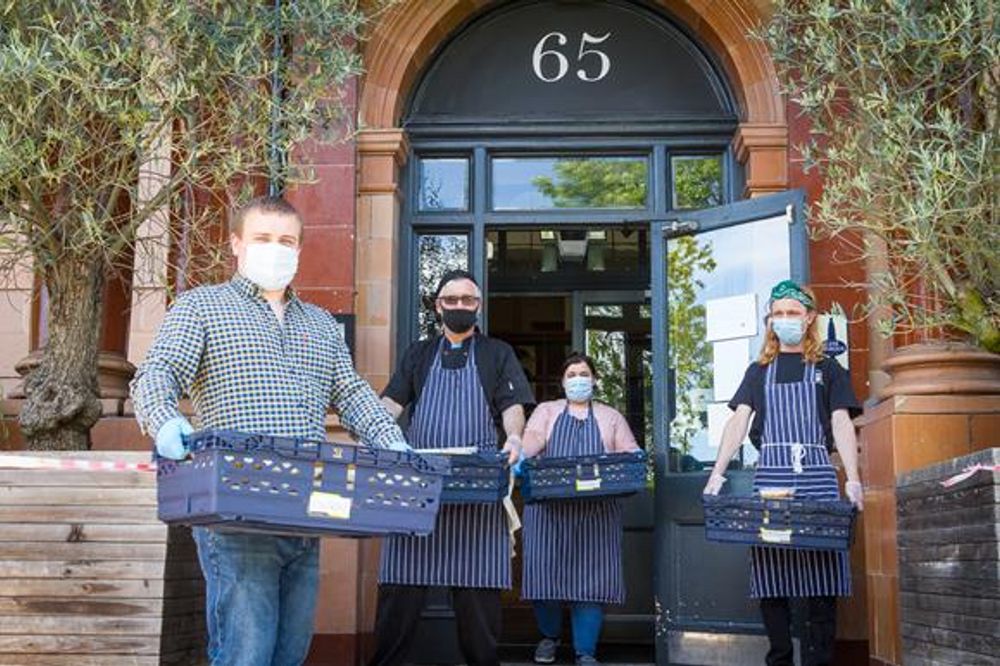
Members of the Three Cheers team outside the Rosendale. Photo: tonybrownphotography.com
The Three Cheers pub group chain, with gastro pubs across the south of London, has been able to raise over £5,200 from its own customers that is now using to help feed children in food poverty in its local communities as well as key workers across the NHS.
It has opened up the kitchens at The Rosendale in Dulwich four days a week to prepare and cook individually packed nutritious meals for those in most need. The group had intended to tried and feed 1,200 people, but the fundraising has gone so well it is now supporting nearly 3,000 local children. It is working with Open Kitchens, a non-profit organisation, to help get the food to those in most need. Three Cheers says it just needs £1.85 to be able to provide a fresh, healthy meal.
It is hoping to continue its fundraising through its Just Giving page. Click here to donate.
Looking back on 20 years of fine wine trading with Liv-ex
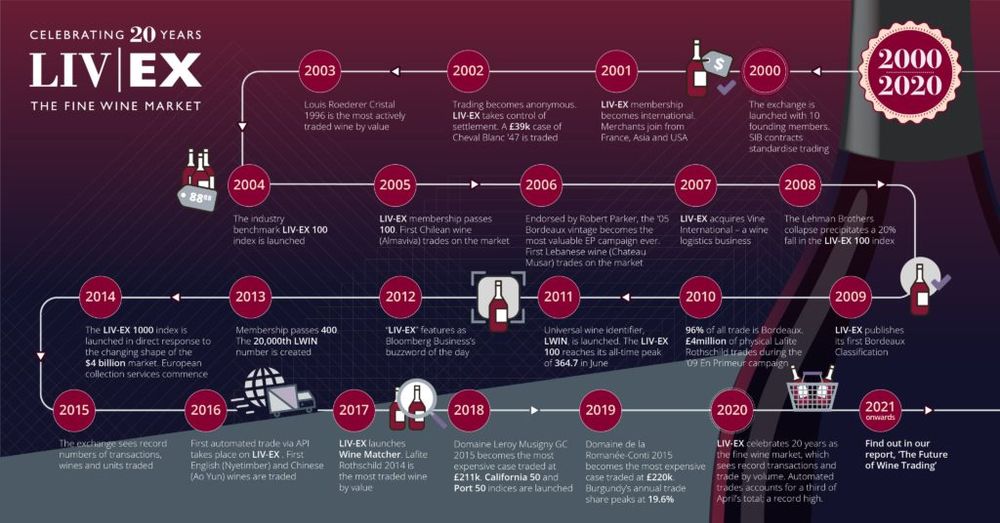
Liv-Ex’s history of fine wine over the last 20 years
Give Liv-ex its due. Here’s an eye-catching way to draw our attention to the fact it has produced a report detailing the last 20 years of fine wine and how it has grown and developed – some of which aided and abetted by the arrival of Liv-Ex itself on the scene in 2000. As it says: “In 2020, the global marketplace for the wine trade [that’s Liv-Ex] celebrates its 20th birthday. It was launched on the principle of the ‘coffee house’ tradition; a meeting place, where the members of the wine industry would come together to exchange data and identify trading opportunities. We take a retrospective look at the significant events that have helped shape the fine wine market we see today and might see tomorrow…”
You can download your copy by clicking here.
Octavian’s new MyCellar platforms opens up fine wine collections for collectors
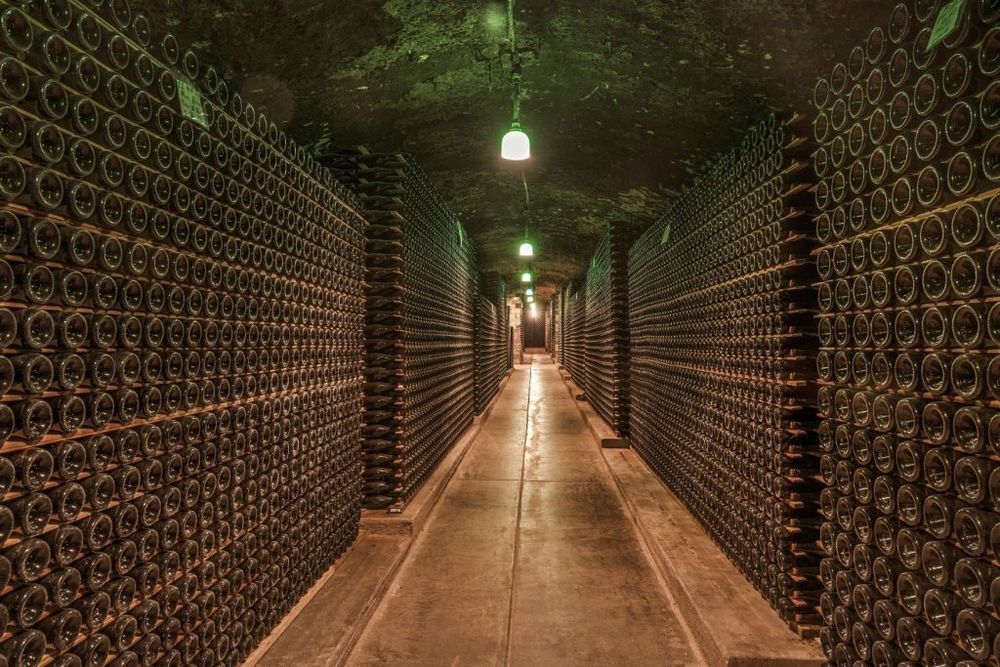
Now where did I put that bottle? Octavian hopes its new MyCellar platform – developed with Wine Owners – will give its collectors greater transparency over their collections
Octavian, the fine wine storage business, has set up a major new service called MyCellar to help its customers better manage their stocks and their ability to keep on top of their wine collections in real time, thanks to a new wine management software service (SaaS) created by Wine Owners. Octavian’ vast wine supplies, which are famously held in a former World War II mine, includes many of the world’s most valuable wines as well as co-ordinating one of the largest inventories of fine wine anywhere in the world that occupy the equivalent of 11 eleven football pitches.
The MyCellar portal is being offered to all Octavian private clients to give them more open and immediate access to their stored wines, allowing them to value their worth and get a better understanding of the value and price movement of each bottle in the secondary market, which the new platform will allow them to take advantage far more effectively.
Octavian’s enhanced fine wine exchange means sellers and buyers can connect to the trade through its collection far more efficiently by allowing “self-directed peer–to peer trading”. It means it can now give its collectors far more “transparency, greater control, and an end-to-end service that makes it simple to get the most out of their hobby or investment,” says Wine Owners’ chief executive Nick Martin.
He adds: “We are so very proud to have been selected by Octavian to transform their private client experience with market-leading online collection management and trading. The white labelled platform we have configured for the exacting demands of a major wine services brand further cements our position as a global specialist provider of fine wine software that delivers results and a rapid return on investment. The reduced risk of movement, full insurance and verified provenance provided by the Octavian exchange allows for quick and secure trading and settlement 100 feet underground! It is as safe as it is discreet.”
You can read more about what services Wine Owners can provide here.
May 22
Beers, wines and spirits is fastest growing grocery category
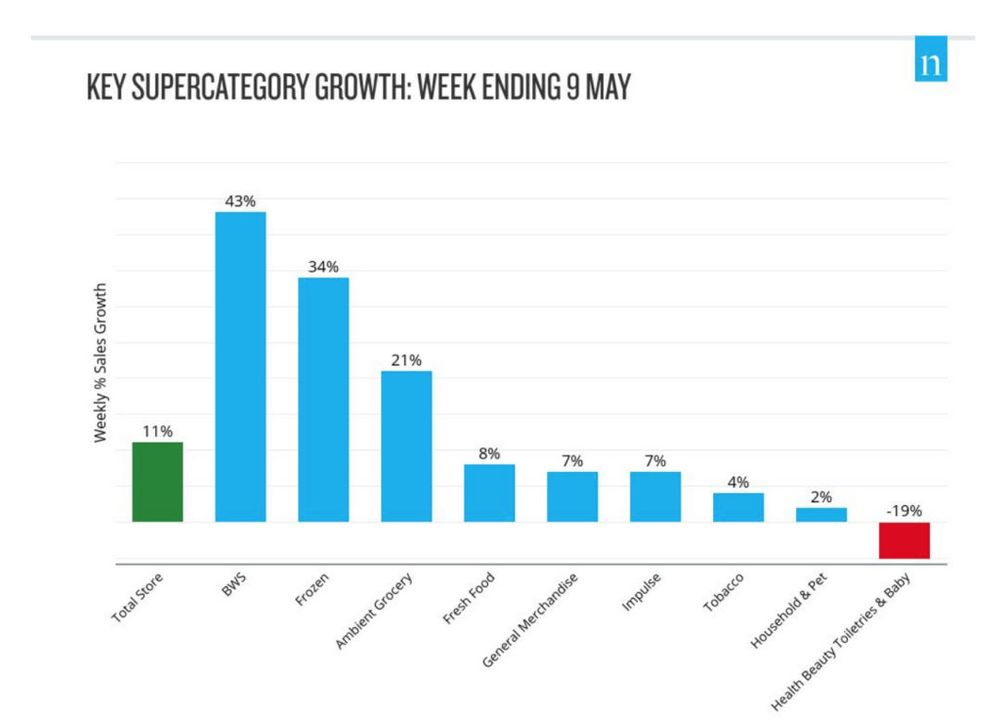
We are now over two months into the Covid-19 lockdown in the UK and the picture for the off-trade alcoholic drinks category could not be stronger. The latest Nielsen figures for the week to May 9, covering all major supermarkets, show overall sales of beers, wines and spirits outpaced all other so called ‘super categories’ for the first time, up an impressive 43% against overall average sales growth of 11%. This was probably, says Nielsen, due to the bank holiday and warm weather which bodes well for this bank holiday weekend too.
Nielsen says: “Shoppers spent £59m (+2.4%) more than the previous week, and £249m than the same week last year. This is the third consecutive week that total store sales in the grocery multiples have averaged £2.5 billion, evidence that British shoppers are settling into their new routines. And, we expect to see similar sales next week.”
When breaking down the categories down it’s clear the closure of the on-trade is seeing more traditional pub drinks now being bought in supermarkets – like stout (up 86%) and cider (up 83%).
Nielsen says “the current strong growth in supermarket alcohol sales looks set to continue as there is no immediate restart to the out-of-home food and beverage channel”. As we go into summer then that will see further potential rises in alcohol sales as we move to cooking outside and having BBQs. Nielsen predicts that “by the end of May, shoppers will be spending around 5% to 10% more in supermarkets than they did before the Covid -19 pandemic hit the UK”.
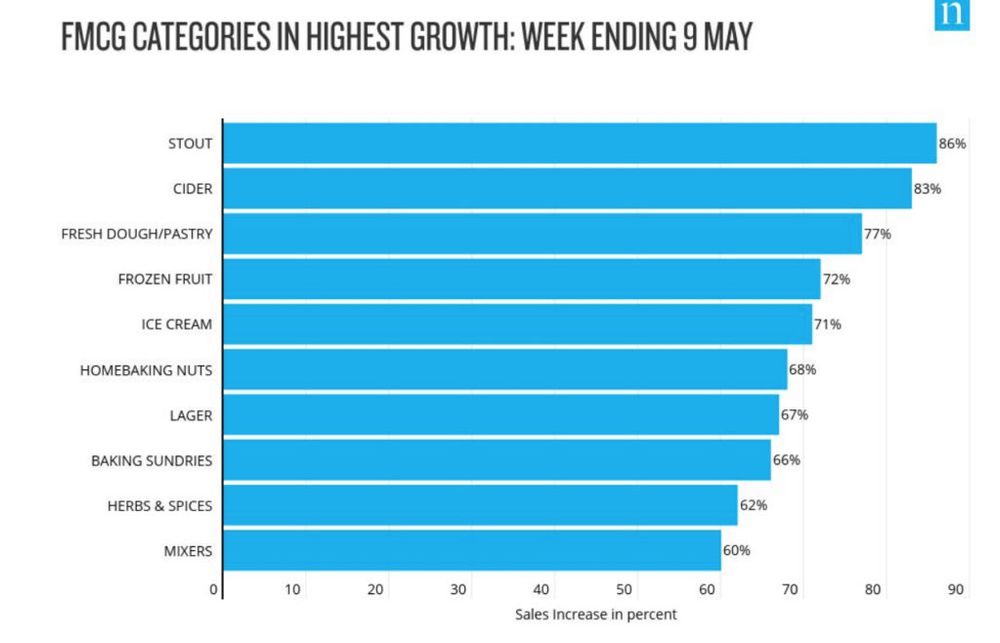
Drinks Trust introduces a number of new Wellness services to help drinks and hospitality staff The Drinks Trust has moved on to the next stage in the measures it is taking to support all staff in need across the wine and spirit industries and hospitality sectors by introducing a series of health initiatives in what it is calling its Wellness Services that will run both during the Covid-19 pandemic and beyond.
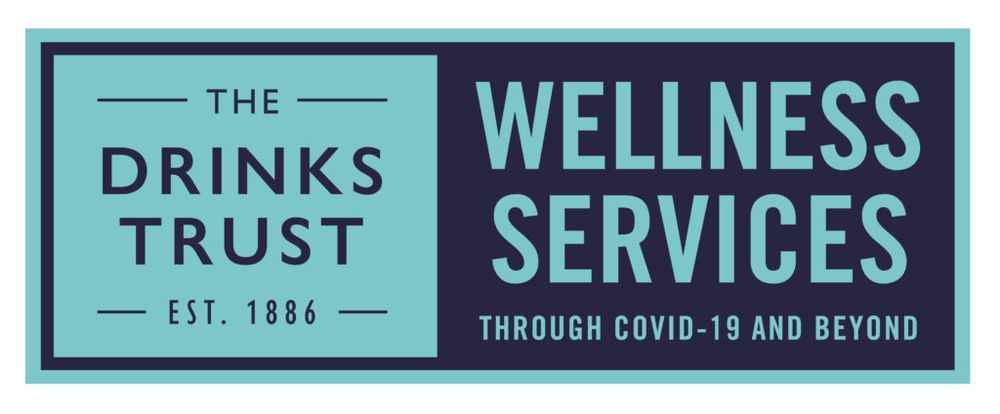
The move is the latest step taken by the drinks charity to provide both financial and practical support to help people with mental and wellness issues. It follows the one-off £250 financial grants it has been able to issue to hundreds of members of the trade who have lost income through this crisis.
It says moves were already in place to introduce a range of Wellness Services prior to Covid-19, but the situation has made the initiative even more important.
Ross Carter, chief executive of The Drinks Trust, said: “Thanks to industry donor businesses such as London Essence and Virgin Wines and to all of our business partners, we are delighted to be able to offer our community an increased range of support services at a difficult time. We are very grateful for their support and hope that this is just the beginning of a broader wellness services offering. We would ask any business in the industry who is able to donate to The Drinks Trust to consider doing so, as our services are needed now more than ever.”
The following services will be available for an initial seven-month period until the end of the year, but it is hoped they can continue, with the right level of support and funding for much longer.
The new services include:
Guidance: Resident wellness and leadership coach, Kat Hounsell (founding director, Everyday People) will be delivering tips and tricks to care for your holistic health. Online and downloadable content and guidelines will also be made available through the Wellness Services website.

Talking Therapies: An initial £80,000 is being invested to provide online video therapy services, provided by Dr Julian, an online and app-based therapy service which is being used by front line NHS staff. A team of therapists and psychologists will provide psychological therapy, through on-line video sessions and instantaneous text, that you can have on your phone, tablet or computer whenever and wherever you want.
Sleep & Insomnia Treatment: Up to e00 individuals will be asked to undertake a week-long sleep and insomnia assessment, with 150 then qualifying for a month-long treatment programme. This service is delivered through app-based technologies and assessment tools, together with a live consultancy from trained sleep and insomnia specialist, Sleepstation.
Mindful Drinking Programme: Being run in partnership with Club Soda, the Mindful Drinking Movement, this will be the chance for anyone who has been furloughed to look at their drinking patterns and help cut down or quit drinking.
Helpline: The Drinks Trust helpline was set up in 2017 and it now plans to expand the service to take on more calls and help more people with access to therapists for further counselling.
Latest global consumer confidence figures reveals how wary people are of returning to restaurants
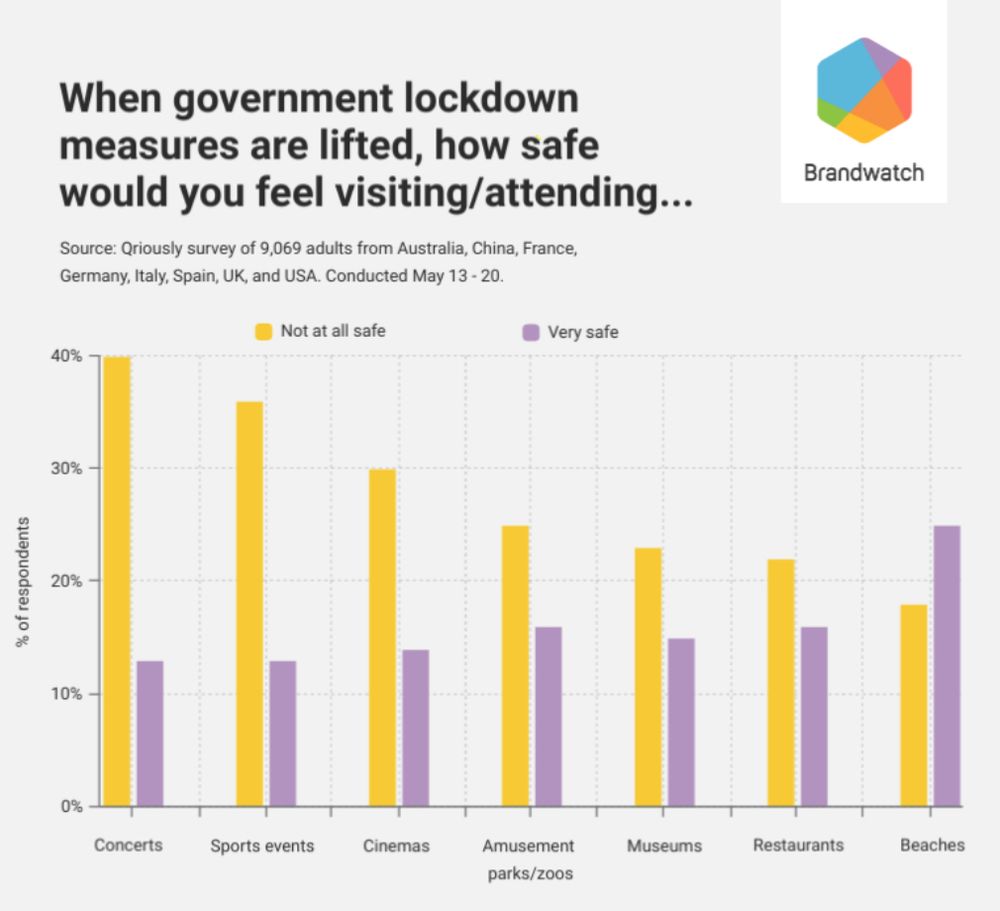
So how confident would you be of going to see your favourite band performing at, say, the O2 Arena, versus going to your favourite local restaurant? Well according to the latest global confidence figures from Brandwatch a night out in a restaurant is far less of a concern – at just over 20% who would feel “very unsafe” against the 40% who would fear going to a concert. That said only about 15% of people would currently feel “very safe” about going out to a restaurant. Which is just a little more than the hardy concert goers.
Overall the picture reveals how nervous the majority of consumers still are about going back to their usual most popular social pursuits, be it the local cinema or going to a sports event.
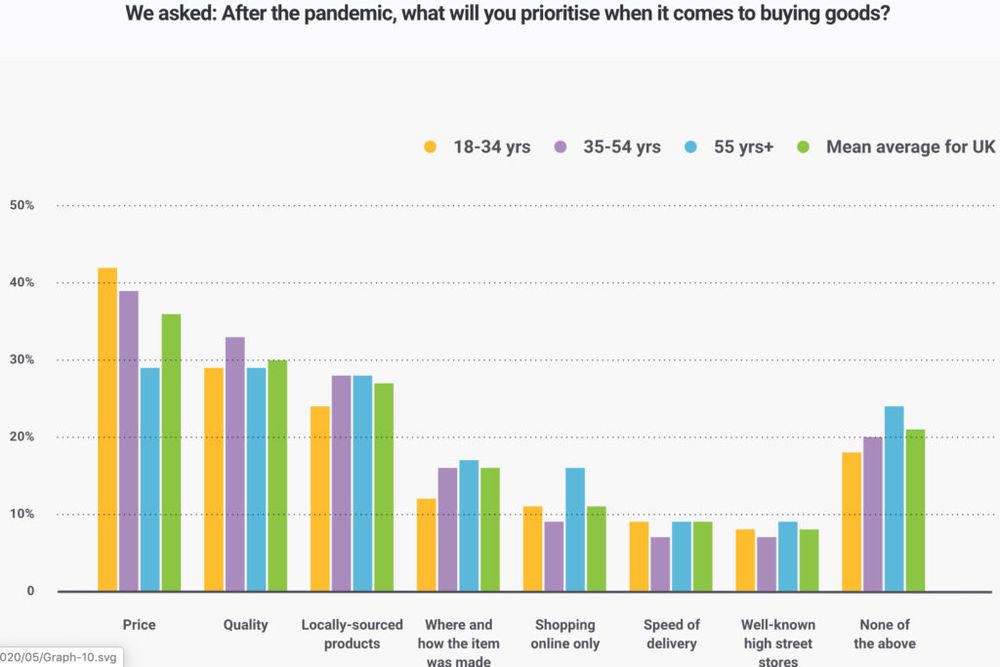
Brandwatch has also been assessing how the UK consumer will feel post-pandemic and what they are likely to be happy to spend their money on, by age group. Price is not surprisingly the top answer across all demographics, but noticeably it is closely followed by “qulaity” and “locally-sourced” products which backs up other consumer research that shows just how consumers have become a lot more discerning during lockdown and are keen to not only buy better, but want to be able to support local businesses where they can.
It is slightly less good news for those who have switched to online as it appears to show online will only be part of a person’s shopping behaviour down the line and it won’t continue to dominate as it is at the moment. That said the near 10% and above 10% shares are bigger than the total grocery online percentages going into the lockdown. Speed of delivery is also lower on a consumer’s priority list for when they would be free to go out and shop where they like.
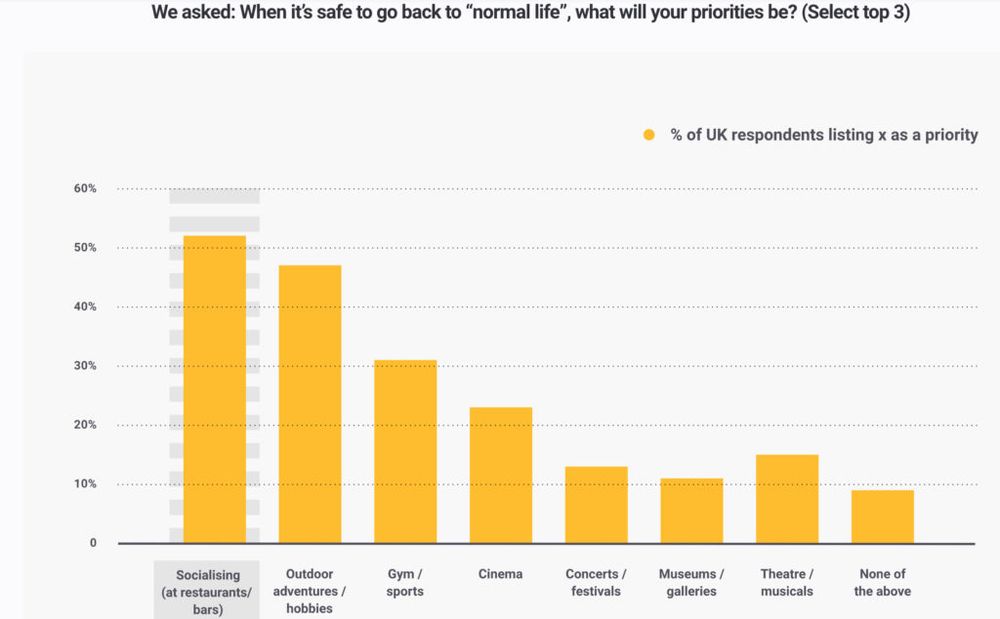
Now here’s a chart to warm the cockles…socialising in restaurants and bars was number one on people’s wish lists when it is possible to do so. With over half of those surveyed putting it first, closely followed by being able to do anything outside. There is a lot less demand and desire to go back to enclosed public places with around 22% looking forward to going to the cinema and around 12% craving to go and see a concert or go to a festival.
Finally we look at some of the drinking trends that have been taking place over the last two months. The fact there are so many more people drinking more than they normally do (between 40%-60% depending on age group) is not really a surprise considering the spike in alcohol sales. The move to trying new drinks might be be slightly over played based on these figures with the vast majority of people choosing to drink what they know.
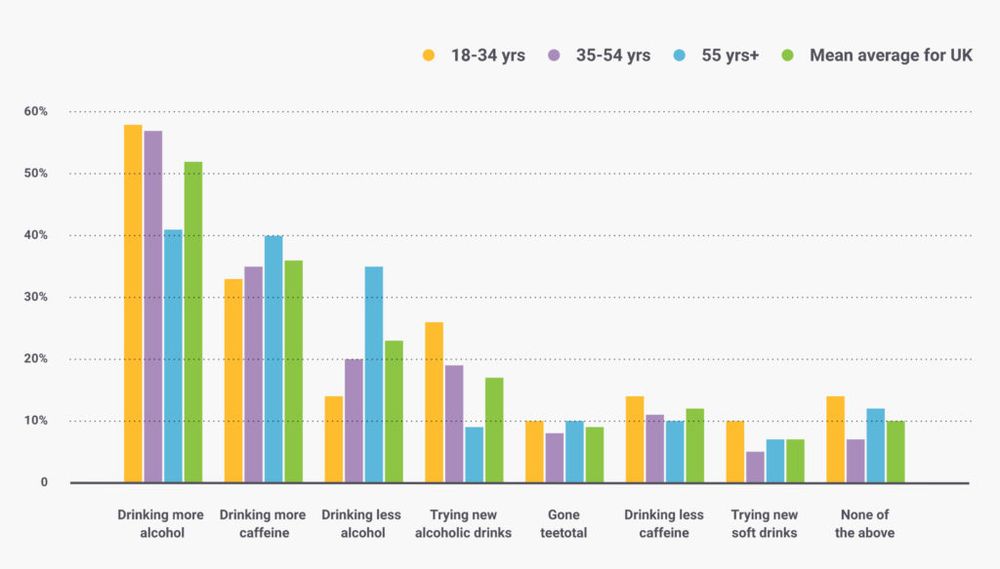
Business execs look to speed up investment in digital and data
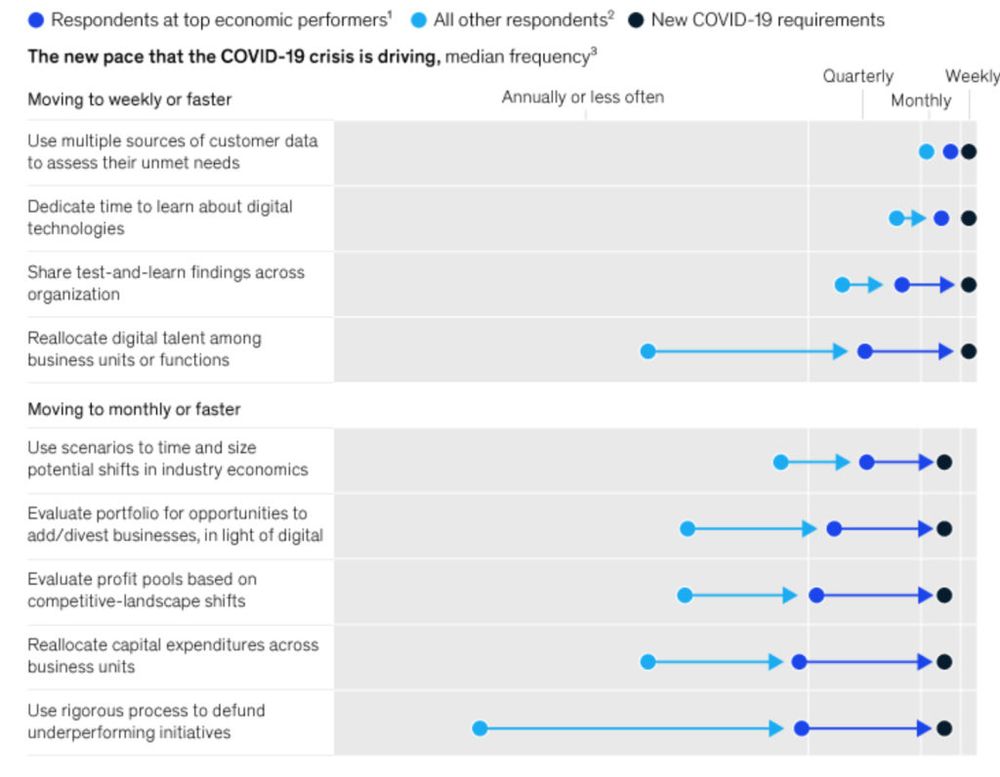
If you have the time this is a chart that is worth stopping and taking a look at. Produced by management consultants, McKinsey, it illustrates just how fast different businesses are changing their business models and strategies to first cope with Covid-19 and then plot a route to recovery and then potential growth. Essentially the impact of Covid-19 on business structures and planning has been so intense that it has resulted in a response that is unprecedented in its speed and scale, says McKinsey. Or in a nutshell decisions and actions that would normally take months, quarters and years to put in place are happening in a matter of weeks.
Top of the ‘to do’ list has been the speed in which companies have turned to data like never before to try and help them what to do next. To so has meant spending more time and money in understanding exactly what their data can do and mean for their individual needs. Which in turn has sped up the ‘test and learn’ processes being introduced.
May 21
Capgemini research: touchless tech and voice solutions will be key to on-trade and retail’s recovery
It’s one thing the hospitality and drinks trade putting in plans and procedures for how it is going to be safe and possible for restaurants, bars and pubs to potentially re-open during the summer, but what do our customers expect and want?
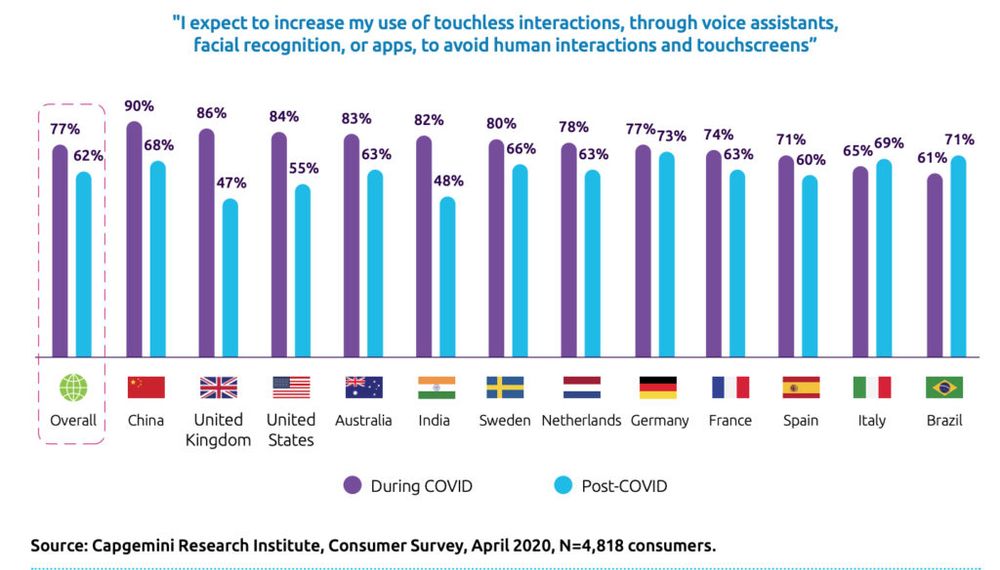
A new study from the Capgemini Research Institute, which surveyed over 5,000 consumers and over 1,000 executives from 12 major economies – Australia, Brazil, China, France, Germany, India, Italy, The Netherlands, Spain, Sweden, the United Kingdom and the United States – revealed the following key findings:
- 77% of consumers expect to be able to use touchless technology solutions when out in a bar or restaurant and would be keen to use pre-ordering and payment apps that minimise any physical contact points. Even when the pandemic is over, 62% expect to increase their use of such touchless technologies.
- 59% of consumers would prefer to use voice-based solutions for public places, such as shops, banks, government offices and the on-trade, again to minimise physical contact. Voice based interfaces are also more acceptable to those who are not used to using mobile apps.

- Businesses need to identify the ‘touchpoints’ in a consumer’s journey where voice-based interfaces would be suitable and can be easily implemented.
- 66% of consumers prefer to use mobile apps at physical locations such as stores, banks and pubs rather than touch-based payment alternatives and 62% would prefer to do so even after the pandemic subsides.
- Although personal security is still important to the majority of consumers, there is more of an acceptance of businesses using facial recognition in the current global situation; 52% would prefer facial recognition for authentication at retail stores, banks, airports, and offices during Covid-19. This though falls to 39% in post-pandemic times.
- Amazon Go has already begun implementing self-checkout systems and automated payments using computer vision.27 As with facial technology, this helps deliver a contactless store experience, thereby reducing the chances of infection.
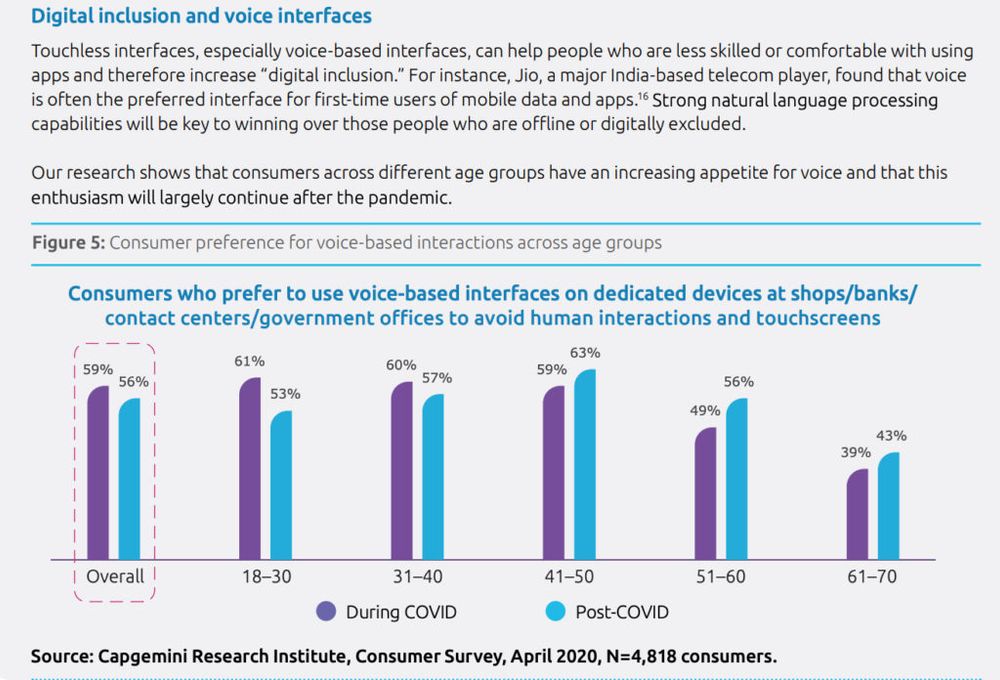
The key for businesses looking to use touches solutions is to adopt a test-and-learn approach, says Capgemini. Make sure you ask and include consumers in any steps you take, before you take them and then assess how well consumers respond to them once they are introduced. You need to secure employee buy-in, it adds.
“The support and buy-in of affected employees will be critical and they will also need adequate training,” adds the report. “Customers will be more satisfied if they can approach employees and get helpful, informed support in using the solution. The use of data and analytics is critical to this as it can help organisations identify what works well and what does not.”
This, though, is easier said than done as previous Capgemini research has found that only 40% of retailers “apply a data-driven approach to implementing insights from in-store automation initiatives”.
It points to a recent Mastercard survey that shows 82% of respondents saw contactless payments as a “cleaner” option and in the first quarter of 2020, Mastercard saw a 40% rise in the volume of contactless transactions. Its own study shows 41% of consumers are now opting to use non-touch-based self-checkout systems (using their own phone, for instance) when out shopping.
We can expect to see new touchless retail formats being developed. Like the new Swedish retailer, Lifvs, which operates a chain of unmanned convenience stores that consumers can access using their mobile apps. Customers can open the door to the shops, scan products, and pay for them using just their mobile apps.
“Organisations,” it says, “should therefore revisit the entire customer journey to identify areas where physical touchpoints, especially shared interfaces, can be replaced with safer alternatives that involve the customer’s own mobile phone.”
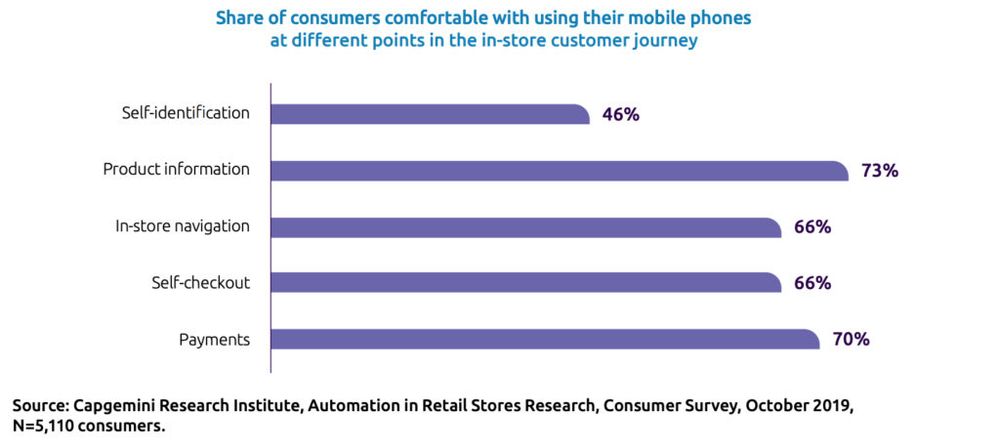
Pinot Grigio, Sauvignon Blanc and Malbec help drive 10.4% total Covid-19 retail wine growth
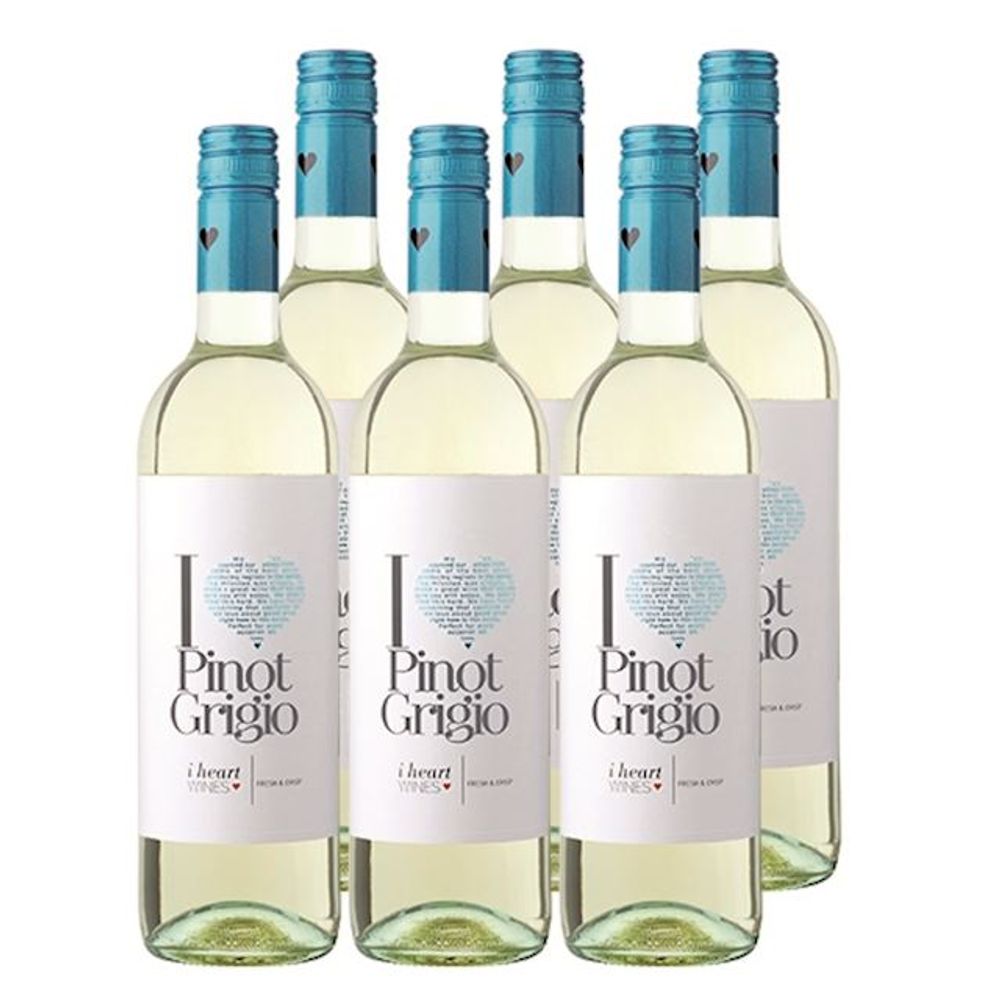
I Heart Pinot Grigio has seen 14% growth in retail during the lockdown as all varietals have done well.
Pinot Grigio, Sauvignon Blanc and Malbec are the three wine variety juggernauts that have boomed even more during the Covid-19 lockdown, according to the latest IRI figures for the 12 weeks to April 19 seen by The Buyer.
Whilst the lockdown had been good news for total wine sales in the off-trade over the last 12 weeks – up 10.3% year-on-year – with all varietals showing growth it is the three rock stars of the variety world, Sauvignon Blanc, Pinot Grigio and Malbec that are still the standout performers, up around 16%. Red, white and rosé sales are all up over 10% over the last 12 weeks, which is also a return to growth for rosé after a decline in sales for the year to end of December of 6.3%. Red and white wine sales are up from just 0.9% sales growth for the year to December 29 (IRI).
It now means Pinot Grigio’s total market sales is £560m, up 6.7% year-on-year, and it is comfortably the second biggest variety behind the UK’s favourite – Sauvignon Blanc. Pinot Grigio’s performance in the off-trade is being driven by major brands. I Heart Pinot Grigio, for example, is now worth £24m RSV, growing ahead of the market at 14% year-on-year and is now the second largest Pinot Grigio brand in grocery.
Overall grocery wine sales were £456m, up 5.4% over the last 12 weeks with convenience taking £104m in sales, up 12.4%. This is a welcome return to growth considering the total wine off-trade market was down 2% in volume and o.4% in value for the year to December 19 2019. Within that still wine was down 1.6% with value growth of just 0.1%. Despite the off-trade growth in the last 12 weeks the overall wine market is thought to be flat at best due to the closure of the on-trade.
Dan Jago: wine’s got a healthy future thanks to the lockdown and changing consumer habits

Dan Jago has moved from premium wine to luxury rifles at Purdeys
“Wine has become really interesting for a lot of people during lockdown.” That’s how Dan Jago, former wine chief at Tesco and chief executive at Berry Bros & Rudd puts the situation for the wine category over the last couple of months.
Although his day-to-day concerns are now about trying to convince those in the luxury rifle market to share their spending with the Purdey’s business he now heads up, he still keeps a close eye on his old stomping ground.
So much so he was the guest for one of the recent zoom debates hosted by Robert Joseph and Polly Hammond as part of their Real Business of Wine series that has been running throughout the Covid-19 lockdown.
Jago was willing to share his experiences working on the supplier, supermarket and specialist retail sides of the wine industry. He believes that with the right mind set and approach the sector is very well placed to come out of Covid-19 stronger than when it went in.
“People will be able to sell better wine,” he added, providing they tap into what consumers are interested in buying.
New opportunities
Yes, there are going to be challenges, particularly for the on-trade, but there will be opportunities too.
“The restaurant trade will rebound, but not at the scale as we saw before. There won’t be the people with the money to put [investment] into restaurants. But we have seen too many openings in recent years in any case. People have become more comfortable spending time at home and they will continue to do more baking, and cooking at home, but also looking to drink better bottles of wine at home too. Which is all to the benefit of the independent wine merchant as most people have bought online rather than stock up at supermarkets.”

Dan Jago during his days heading up Berry Bros & Rudd
He added: “Once we got past the loo roll furore, people looked elsewhere to buy their wine and the wine industry will be a better place for it.”
He likened it to the “tide going up” and people being willing to spend just a little more on the wine they are buying.
Jago agreed with the idea that trends that were rife before Covid-19 have only been accelerated during it. Particularly around creating and selling products that are “desirable and hand crafted and have a point of difference for that product”.
He said moving full time into the luxury market had certainly opened his eyes to the “extraordinary” profits that can potentially be made if you can create, promote and sustain a luxury brand. “If you can create something truly unique, then don’t be afraid to do it.”
He said there was still enormous opportunity for wine in the UK. Yes, it was seen for years as the “epicentre” of the wine world for many years, before the US took over, but “we still have a very healthy wine market in the UK.”
But remember, he stressed, “as a population we have got a relatively small number of people buying wine”.
Looking back on his own career in wine retail he admits he too was guilty of being part of the great discounting of wine that has gone on, particularly around the half price deals in the major grocers. All of which meant the consumer did not have a real identity of what a particular bottle of wine should cost. “It did confuse consumers,” he admitted.
But the half price deals became part of the marketing mix with each grocer competing to out do each other. When he was able at Tesco “to pull the plug” on half price deals there was a “sigh of relief” in the trade overall.
New Zealand Wine Diaries: Session Two – Chardonnay & Pinot Noir at the OTHER 45th Parallel
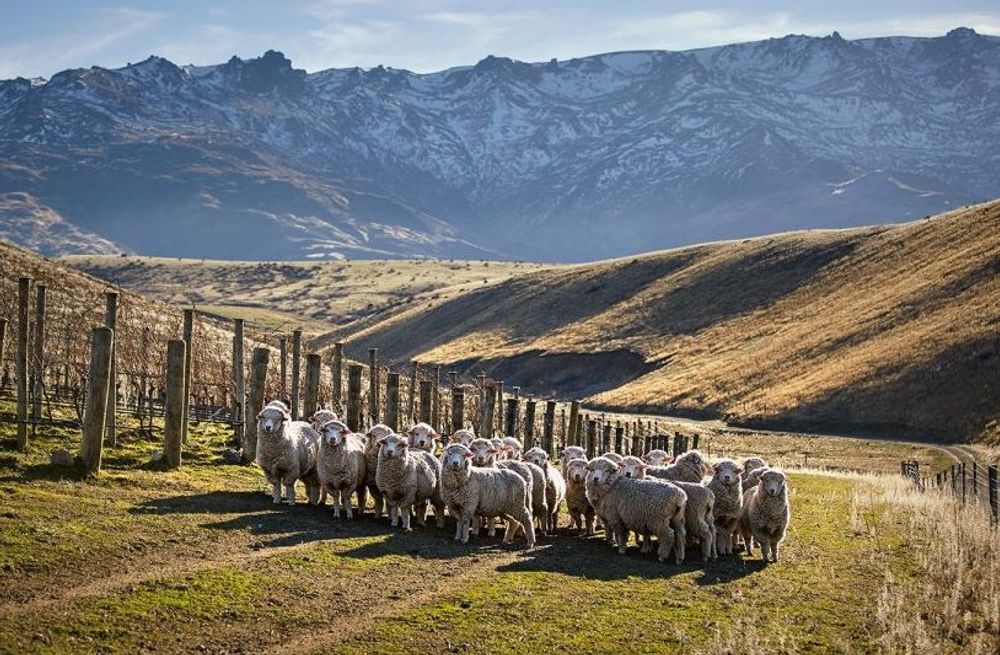
“You look’n at me?” We can all take a Zoom trip to New Zealand for the second in the Wine Diaries series on May 27
You can take part in what will be the second in a series of Wine Diaries, held via Zoom, by New Zealand Wine on May 27. It all takes place in the UK at 8-9pm, North America West Coast 12-1pm, East Coast 3-4pm & UK 8-9pm.
This session takes a deep look at two of Zealand’s most successful varieties, Pinot Noir and Chardonnay, clearly comfortable in this cool climate. New Zealand’s latitude may correspond with other celebrated Pinot and Chardonnay regions, but the nuances of style here are uniquely Kiwi. It will be the chance to explore the shades of flavour delivered from Northland to Central Otago and many regions in between, while tracing the rise to prominence of Pinot and Chardonnay in the shadow of Sauvignon.
Once again the debate will feature John Szabo MS, Cameron Douglas MS, David Keck MS and Ronan Sayburn MS.
You can register to take part here.
May 19
PepsiCo responds to Covid-19 by launching two direct to consumer sites
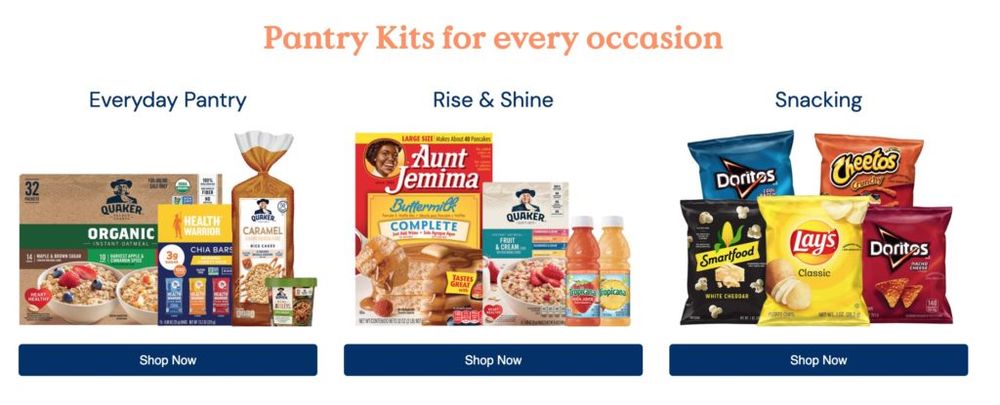
PepsiCo has been able to launch its pantryshop DTC website within a month
PepsiCo is the latest major FMCG brand to announce it is moving into direct to consumer with the launch of two websites – snacks.com and pantryshop.com – that will allow its customers to buy a large selection of its famous brands and have them shipped to their home. Snacks.com is the DTC face of FritoLay and its range of crisps and snacks. The Pantryshop covers, as it says, households brands meant for the cupboard, from Quaker Oats to Tropicana fruit juice and also Doritos and Lays crisps.
PepsiCo claims it had been planning the two DTC sites for some time, but the impact of Covid-19 has been great on people’s shopping habits and the big switch to online buying that it had brought forward its plans. The pantryshop.com site has been developed within a month and adapted in response to shifting consumer behaviour during Covid-19 and our collective desire to keep our pantry full.
Gibu Thomas, PepsiCo’s global head of e-commerce, told Modern Retail that it very much sees its DTC expansion as being “complementary to its overall retail business”. That might be the case but there is a feeling amongst brand experts that major brand businesses, even of the scale of PepsiCo, are using the Covid-19 crisis as protective cover to justify their change in trading strategy when it comes to their negotiations with the major grocers.

Whatever steps it is taking it is doing so in step with consumer demand. As Thomas explains: “As consumers are transitioning to this channel (e-commerce), we are making sure that we are continuing to drive the kinds of growth that we drive for retailers regardless of how consumers are shopping.”
He claims Covid-19 has accelerated the move to e-commerce for food and drinks brands by five years. Whilst it is offering some of its major brands DTC it is also using the sites to push more niche brands that arguably struggle to get as much shelf space. Or as Thomas puts it: “We wanted to give consumers a destination to get those brands as well.”
But it’s clearly early days and the sites will be adapted as they go: “We will look at consumer feedback and learnings, and we will iterate and pivot as it goes along,” he adds. “We want to know if it is something they love enough to want to tell their friends about. Our goal is to iterate until we create a proposition that is sticky. We will learn lots of things that will allow us to make not just these offerings better but also make our overall retail business better.”
It will also allow it to see how well its more niche brands do and if they do well it will “then that is a data point our retail partners would like to know because obviously they want to be able to meet the demands of this consumer base,” he adds. “Any data we think would help our retail business get stronger, we would share with our retail partners.
“The rate of change in this space is only going to accelerate — coronavirus was an artificial thing that we didn’t anticipate that accelerated the channel significantly, and fortunately we had been investing for many years in preparation for that, so it allows us to be more prepared than we otherwise would have. Nobody quite knows what consumer behaviour is going to be like post-this phase we are in right now. I think speed and agility is going to be even more important than when you don’t have certainty. Change typically benefits players that are agile and nimble,” explains Thomas.
Beavertown Brewery enjoys instant DTC success as it switches production from on-trade to cans

Beavertown remains committed to its on-trade customers even though it has had great success with its new DTC model
Beavertown Brewery has been able to switch to DTC during the Covid-19 crisis and turned what would have been a loss of 85% of its business through the on-trade into a new revenue steam that has seen its online sales balloon by 1000%.
What had been a small e-commerce platform before the lockdown has been transformed overnight from doing £1,000 in sales a month, to £25,000 in the first 24 hours of pubs and restaurants closing.
Founder Logan Plant has now increased its online team from two to eight and is now only producing cans for consumers rather than kegs for pubs. Together with his creative director, Nick Dwyer, he is now looking at how it can take its famously distinctive labels and use its new, and growing, consumer database and move into other areas such as clothing, and even comic books.
It is already finding ever more creative ways to entertain its new consumer base and has established the ‘Beavertown Session’ every Friday at 4pm where you can see everything from an art class with Dwyer, to doing yoga with beer or a music performance – which is apt considering Plant is the son of rock star, Robert Plant .
“The way we see it, Beavertown is more than just a beer. So if we can keep customers stimulated and interested and take them on that journey with us – as much as it’s a negative we can make a positive out of that situation,” he told The Drum.
“There’s a lot of different things. We feel we’re more than just a beer so how can we transcend that? Direct-to-consumer is the future.”
But he stresses the on-trade is still going to be the core part of its business when it re-opens and it is doing what it can at the moment to help its customers.
“The 2020 contingency plan is about trying to do the right thing. Trying to support our accounts for them to get through this as best as possible and get their doors open. And trying to dip and dive to understand the opportunities we have. There’s things we’ve done and for the future but we’ve had to plan as best we can to support one and another to get through this as strongly as possible.”
Calls for self-employed payments to be extended until October
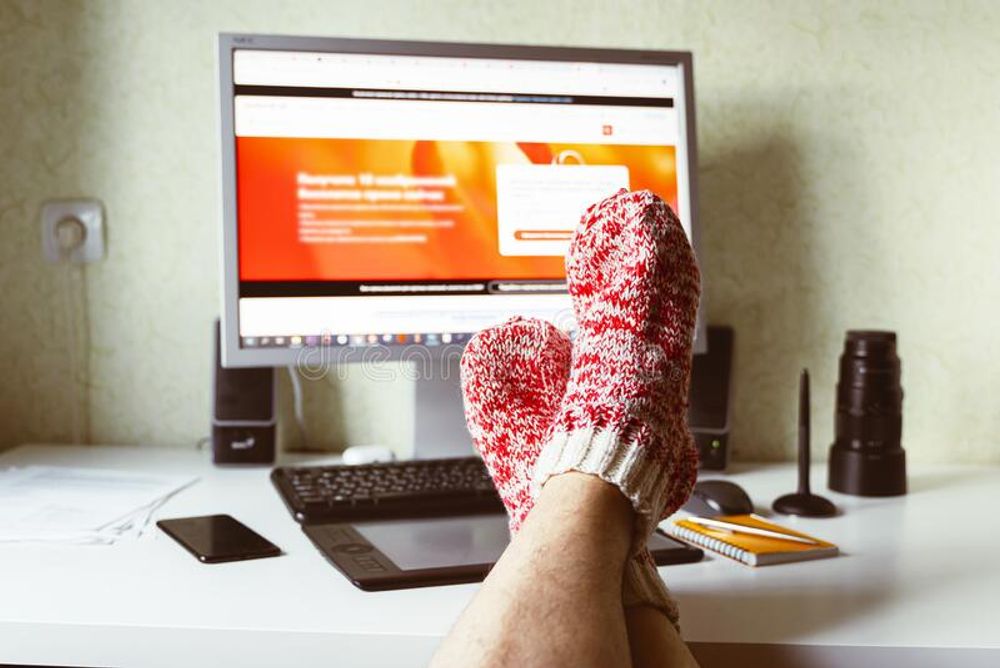
Self-employed need as much help as employees on the furlough scheme say trade bodies
Pressure is mounting on the Chancellor, Rishi Sunak, to replicate what it has done with the government’s Coronavirus Job Retention Scheme – which has been extended until the end of October – by doing the same for the country’s self-employed.
Only now are those who are self-employed, and eligible for government payouts, able to apply to the HMRC for money to cover lost earnings during March, April and May. But whilst the Chancellor has been quick to say the furlough scheme is being extended for its Job Retention Scheme he has remained tight lipped about what future help there might be for the self-employed.
The current scheme allows struggling self-employed workers to claim a maximum of £7,500 (80% of trading profit up to £2,5000 a month for the last three years) which trade bodies way is less than half the support afforded to employees. More than 2 million people have claimed at the cost to the Exchequer of around £6bn so far.
Andrew Chamberlain of The Association of Independent Professionals and the Self-Employed (IPSE) said the scheme is currently only covering its members for lost earnings up to the end of May. “The support available could be tapered down to reduce the cost, either by lowering the £2,500 monthly cap or the percentage of typical profits that can be claimed. While we welcome the support available, self-employed people urgently need some clarification on whether they will be able to survive the next few months,” he told The Telegraph.
Then there are the freelance staff who pay themselves through limited companies and dividends. They are not eligible for any government help.
The Treasury says all policies remained “under constant review”.
It is thought more than 7.5 million workers are currently on furlough under the Job Retention Scheme and could cost the taxpayer as much as £100bn.
The Althorp is open for business….outside
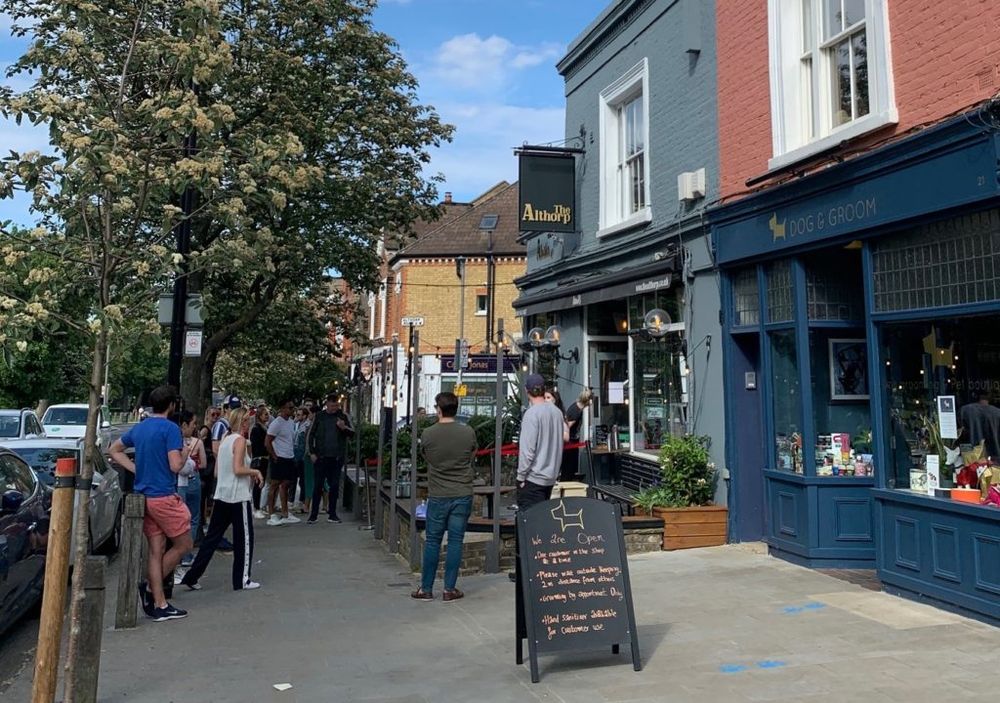
The Althorp is trialling a pop bar outside its pub…could do with a better queuing system mind
The Althorp on Bellevue Road opposite Wandsworth Common is testing the waters in re-opening in setting up a pop up bar outside its pub. The pub, which is part of the City Pub Group, attracted a lot of interest amongst locals when it first opened its doors at the weekend. Perhaps too much interest with not a lot of social distancing going on as locals sort of queued to be served. It is offering a range of beers and wines for takeaway. It at least shows how keen people are for a properly poured pint!
How long before we are back to normal?
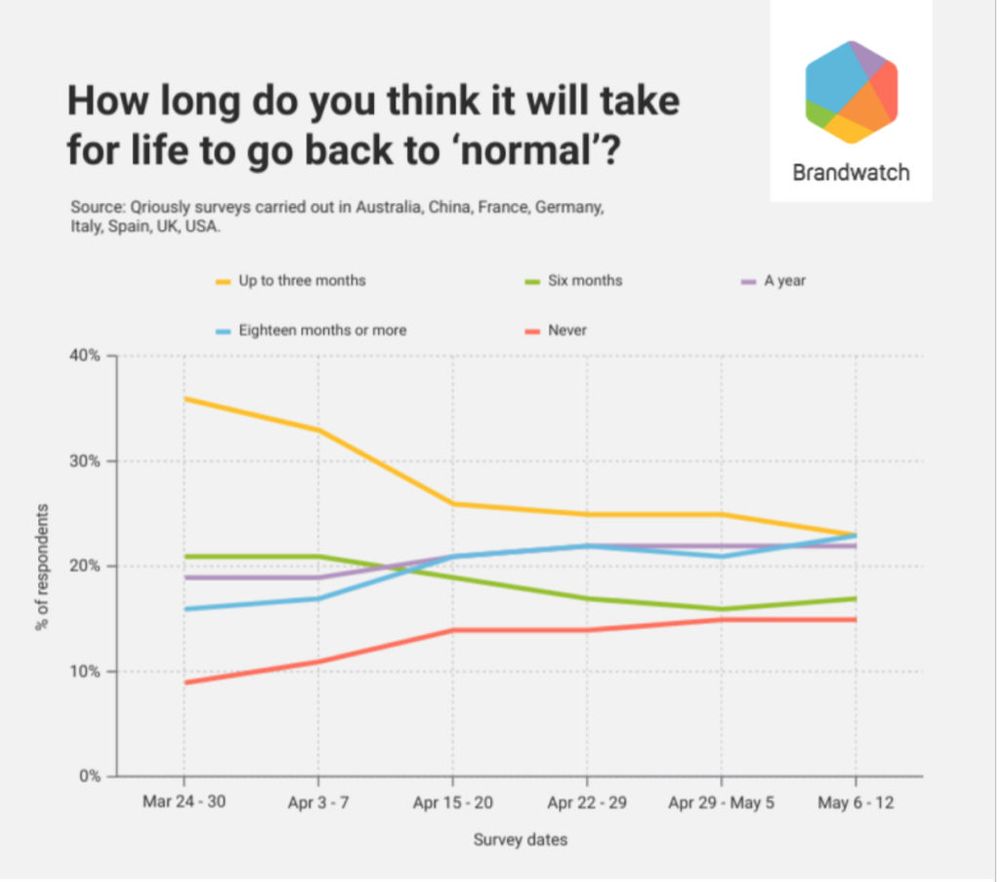
More countries around the world might be coming out of lockdown, but when it comes to predicting and feeling comfortable about when things might get back to some sort of normal then the average person is becoming less pessimistic according to these latest figures from Brandwatch.
Early on in the pandemic, 36% of people surveyed around the world thought things would be back to normal within three months – that figures has now slipped back to 23%. Those who think it will take up to a year is from 18% to 22% and 18 months up to 23% from 16%. There’s also been a steady rise in those thinking there will be no return to normal. People who chose ‘never’ made up 9% of respondents in mid to late March and and 15% now.
May 18
Brandwatch: how consumers around the world are changing because of Covid-19
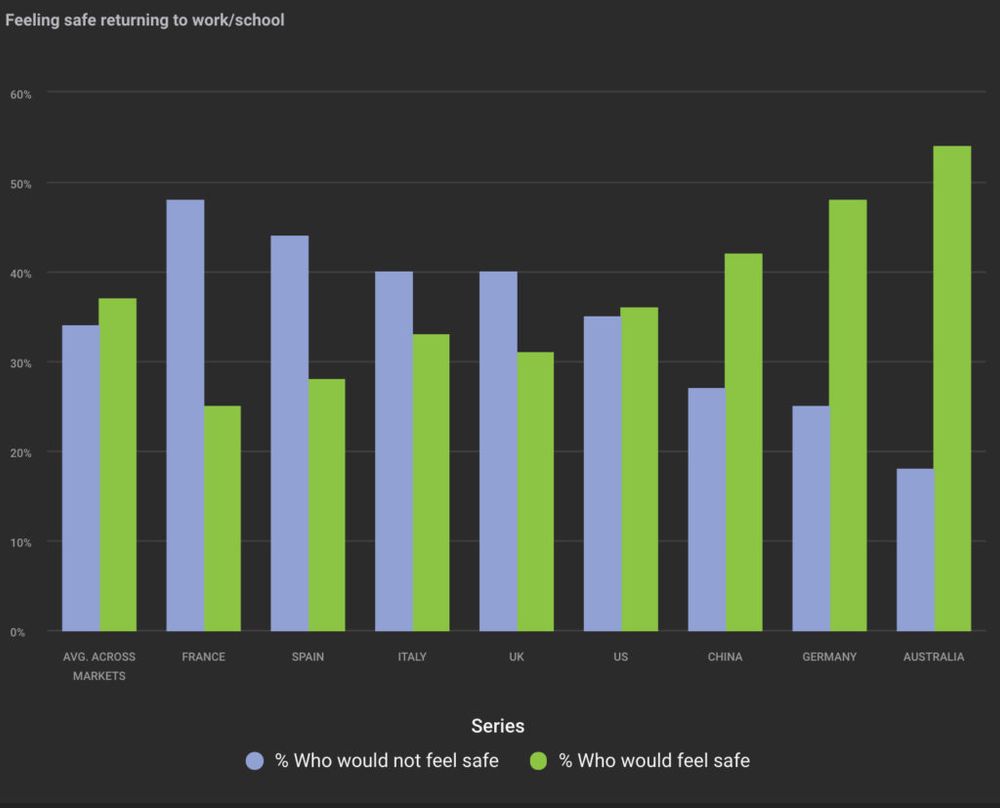
Once again Brandwatch’s Covid-19 Consumer Trends and Insights report reveals key changes in how consumers around the world are adapting their behaviour in response to the pandemic and what is now an increasingly different picture in terms of how countries are coming out of lockdown and preparing to get back to whatever new life now looks like. Here are some of the key trends emerging this week.
- Italians are coming out of their lockdown feeling unhealthy, and unfit with 45% admitting they are not exercising as much as often, and with 40% to 47% saying they have gained weight compared to a global average of 38%.
- Even though more governments are saying it is going to be safe to go cinemas and events, consumer are less sure with 59% across all markets saying they would not like to go to a concert post-lockdown; 55% for sporting events and 50% for cinemas. In the UK it is around 63% for concerts, 62% for sport and 58% for cinemas.
- There is a marked difference between the rest of the world surveyed and UK when it comes to people visiting close relatives: whilst the global average is just under 50%, in the UK it is over 65%.
- The UK has also seen a drop amongst those who are social distancing from 69% in week seven to 60% in week eight.
- 42% of the 33m conversations tracked on social media were people talking about and concerned about being unemployed.
- There is a marked difference around the world between people’s confidence about going back to work, with Australia way out ahead in terms of re-assurance. There are more in the UK who feel unsafe about returning than those who do. But the figures are dropping.
- 12% of online posts globally about people returning to work with the majority saying they would prefer to stay working from home with many saying they would switch jobs or careers if they are not offered more flexible working by their employers.
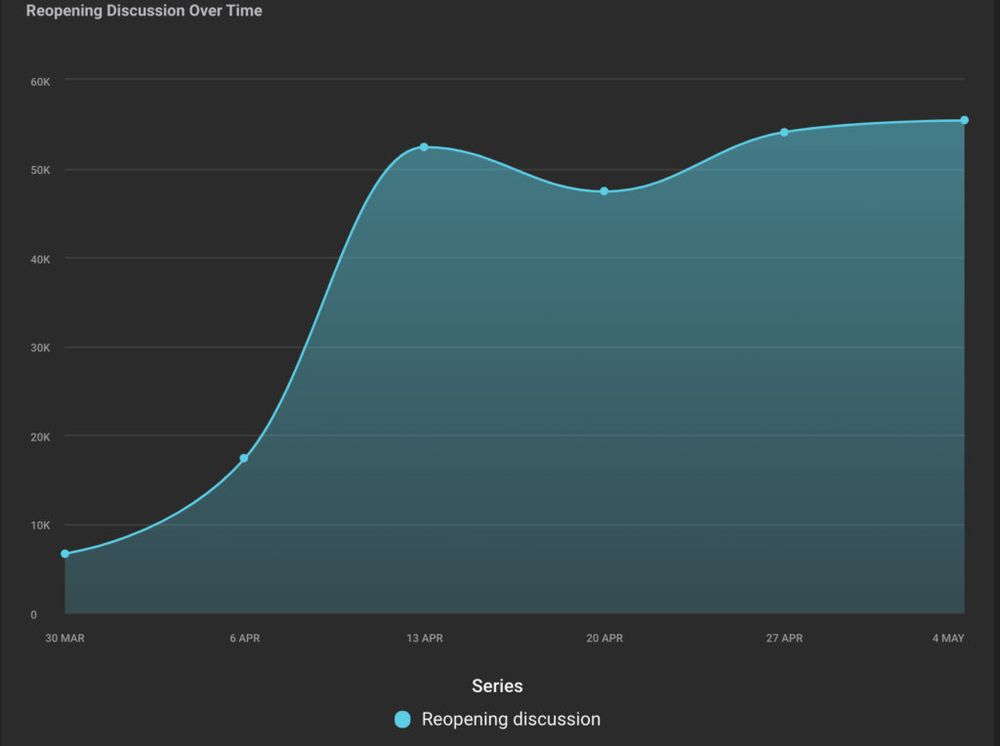
The chart above shows how the world is collectively waking up to their countries re-opening post lockdown
- There is an increase in social media chat about drinking certain brands and styles of drink following headlines about $1bn in untapped beer being thrown away. With an increase in people sharing videos and pictures of making cocktails and sharing recipes as well as where to buy local craft products to support local producers.
- Equally more people are sharing what new recipes and dishes they have cooked in lockdown.
- Technologies that can help us with social distancing post lockdown are also trending with talk of payment and ordering apps in the mainstream media.
- A fifth of people online are talking about their concerns about retailers re-opening and the need for them to be more careful and to introduce more social distancing rules and temperature checks and are critical if they are not. If they don’t many won’t visit them.
- Below are the key trending themes in social media chatas about retail and grocery with wine stores and liquor stores both featuring.
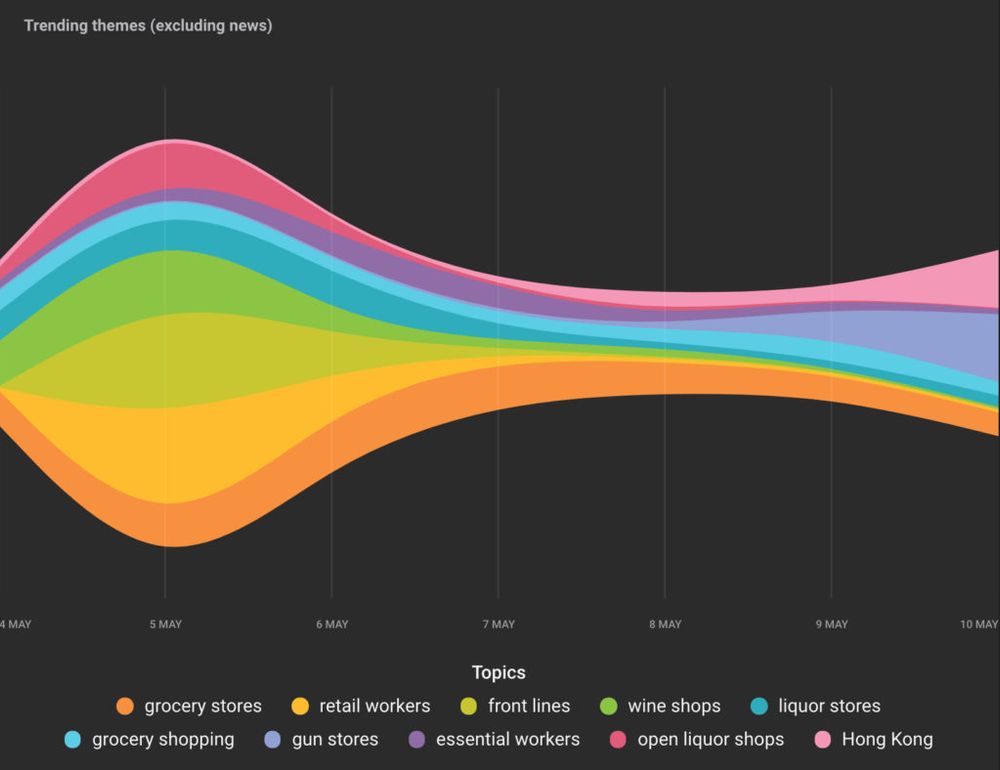
Corbin & King staff say thanks to customers for their voucher donation
Here’s a video that really brings home the unique connection there has been over the last couple of months between restaurants and their loyal, regular customers. Whilst their doors might be shut so many restaurant operators have shared how overwhelmed they have been by the support they have had from customers offering to help where they can, and, in particular, back voucher schemes whereby they can pay now for food and drink down the line.
Corbin & King went a step further and called out to its customers to help raise money so that its staff could be paid in full at this time, allowing it to top up the 80% furlough payment from the government. It pledged to give 50% of any voucher payments directly to its staff.
As a way to say ‘thank you’ the group has issued this video to its customers with personal ‘thank yous’ from members of its staff. Jeremy King, co-owner, says: “I can’t tell you enough just how much this has meant to all of us at Zedel. It has given the staff such a fillip and some hope in the most trying of circumstances.”
Napa Valley Vintners pledges £12.5k to the Drinks Trust with trade education programme

The iconic welcome sign to one of the world’s most famous and premium wine regions
Napa Valley Vintners has come up with an initiative that helps spread the word and understanding of its wines within the UK and Irish wine trade, whilst raiding much needed money for the Drinks Trust at the same time. For everyone who completes the free Napa Valley Rocks online course, which looks at the region’s soils, climate, history and wines, Napa Valley Vintners will donate £25 up to £12,500. Which is the equivalent of 500 members of the trade taking part.
“London and the UK have long been a centre of great importance for wine producers, and a valued and supportive market for Napa Valley wines,” says Rosemary Cakebread, proprietor of Gallica and chair of NVV’s international marketing committee. “In this challenging moment, it’s only right that Napa Valley chips in and supports our friends in the UK hospitality trade.”
NVV will also send a bottle of Napa Valley wine to each trade person who completes the course to enjoy and share what they think on social media using the #itsfromNapa, #NapaCares and #TheDrinksTrust hashtags.
May 14
Anthony Pender of Yummy Pubs: realities of making a pub safe post lockdown – technology will be key
So just how are bars, pubs and restaurants going to come back after the lockdown? What measures do they need to introduce to ensure safe distancing, and how practical are they going to be for the average sized outlet?
Here’s a fascinating and very open behind the scenes look at how Yummy Pubs, co-founder, Anthony Pender forsees the changes it will have to make at just one of its outlets – The Somers Town Coffee House – as he takes Katy Moses from KAM Media through the steps it is looking at and the thought process behind them. He says for him the challenge breaks down to two issues: the reality that operators have to face up to if their outlets are going to be safe for staff and customers; and the consumer perception there is going to be about how safe on-trade outlets are going to be overall.
To really make it work will need big steps in technology that will allow for pre payment apps and the removal of both standing to drink and queuing at the bar to be served. With all payments being carried out on a person’s “personal device”.
“Everything is going to have to be seated tables service. People aren’t going to be able to vertical drink,” he says.
To do so will require new technology: “We’ll need to reduce the contact points down with our guest. Where we always tried to maximise the contact points with our guests, we’re now going the other way and trying to withdraw ourselves from our guests.”
It is already looking at how ordering and paying at the table through smartphone apps and pre-ordering services. They’re looking at set-price and set-menus, allowing them to more easily cater for demand too.
“We’re asking our IT companies to deliver this in 8-10 weeks so I’m sure there’s going to be challenges. But I think we’re going to see four years’ worth of innovation taking place in six weeks, because we have no choice. What we start with in 8-10 weeks will quickly evolve by Christmas to be even more advanced.”
He adds: “We’re already accepting that our staff will have to wear masks, it’s very imposing, it’s not friendly, but we’re going to need to do it. It will happen and PPE will become a workable part of working behind a bar.”
Government hospitality taskforce
The government has set up a ministerial-led taskforce for pubs and restaurants to develop plans for how and when the sector can reopen. the new “force” is one of five that is being introduced to get the UK back up and working again. The hospitality one will be overseen by the Department for Business, Energy & Industrial Strategy. It will be working with key trade bodies and industry leaders in the sector to look at how restaurants, bars and pubs can safely open – including The British Beer & Pub Association and UKHospitality.
Kate Nicholls, chief executive of UKHospitality, says of the initiative: “A great deal of lateral thinking and planning will be required to help businesses open, hence our efforts to draw up protocols and work co-creatively with stakeholders to inform hospitality sub-sectors on how best to prepare venues for safe reopenings. This is for the safety of staff, customers and visitors, and for hospitality to help drive economic recovery.”
Wine Intelligence: UK wine drinkers drinking more but spending less per bottle in lockdown
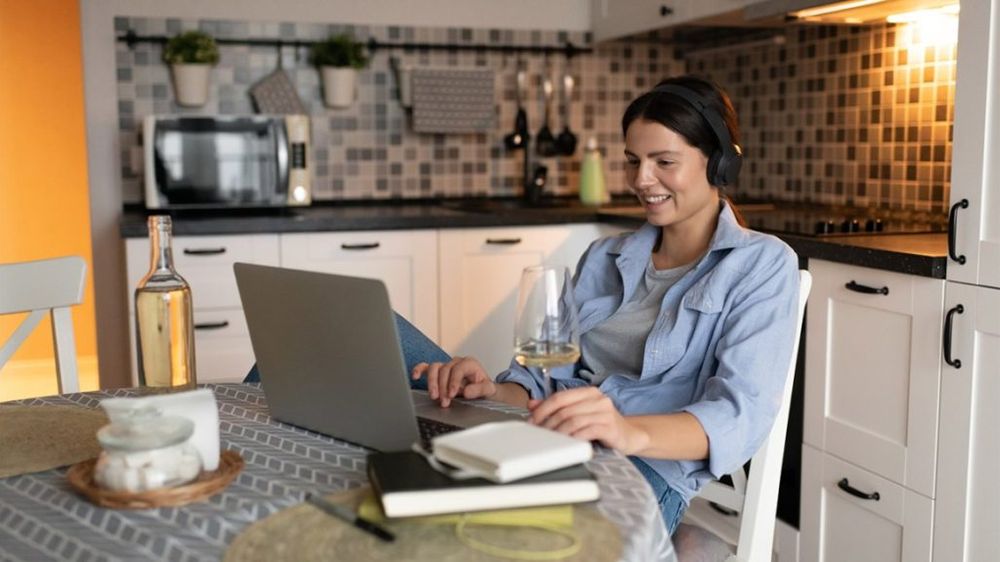
Drinking wine along to a zoom call with friends has helped raise wine consumption during lockdown says Wine Intelligence
Wine Intelligence claims that whilst the average wine drinker in the UK is buying more wine in the lockdown, they are also spending less per bottle when they do. They are also not waiting for the evening to crack open a bottle but are imbibing during the day too. Particularly as lunch has become more of an event whilst being at home.
Overall its figures show that the average wine consumer is now having wine on 10 occasions per person per month for the first time, with 16% of consumers saying they now drink wine every day, up from 11% pre-lockdown. The study is based on the findings of its UK COVID-19 Impact Report which polled 1,000 UK wine drinkers during March and April. It claims the report shows:
- increased spending on wine during the lockdown “is likely to be sustained, as wine is now being consumed at lunchtime, or catching up with friends online, replacing the trip to the restaurant with a more indulgent evening meal”.
- over half of the UK wine drinkers are having wine during the day, with a third saying their day-drinking was happening at least once a week.
- but buying more wine also means the average price per bottle has dropped, across all age groups, and income streams.
- this is a “sudden reversal of a trend of several years’ standing, where consumers in the UK have been trending towards drinking less but spending more per bottle”.
- that said 25% of consumers said they spent over £8 a bottle during March compared to 22% in March 2019.
- around 30% said they would be less likely to visit a restaurant post lockdown, while 21% said they would be more likely.
Wine Intelligence’s Lulie Halstead says: “The UK wine consumer has, temporarily at least, reversed their long-established trend towards drinking less but better, and is now seeking volume and value – and significantly increasing their exposure to online channels of purchase. At the same time Britain’s wine drinkers are understandably cautious about what comes next. Respondents are telling us that expensive holidays and big social events do not seem appropriate, but small indulgences like trying new food and wine resonate more.”
Here is a chart from Wine Intelligence’s new research in the US about wine drinking trends during lockdown
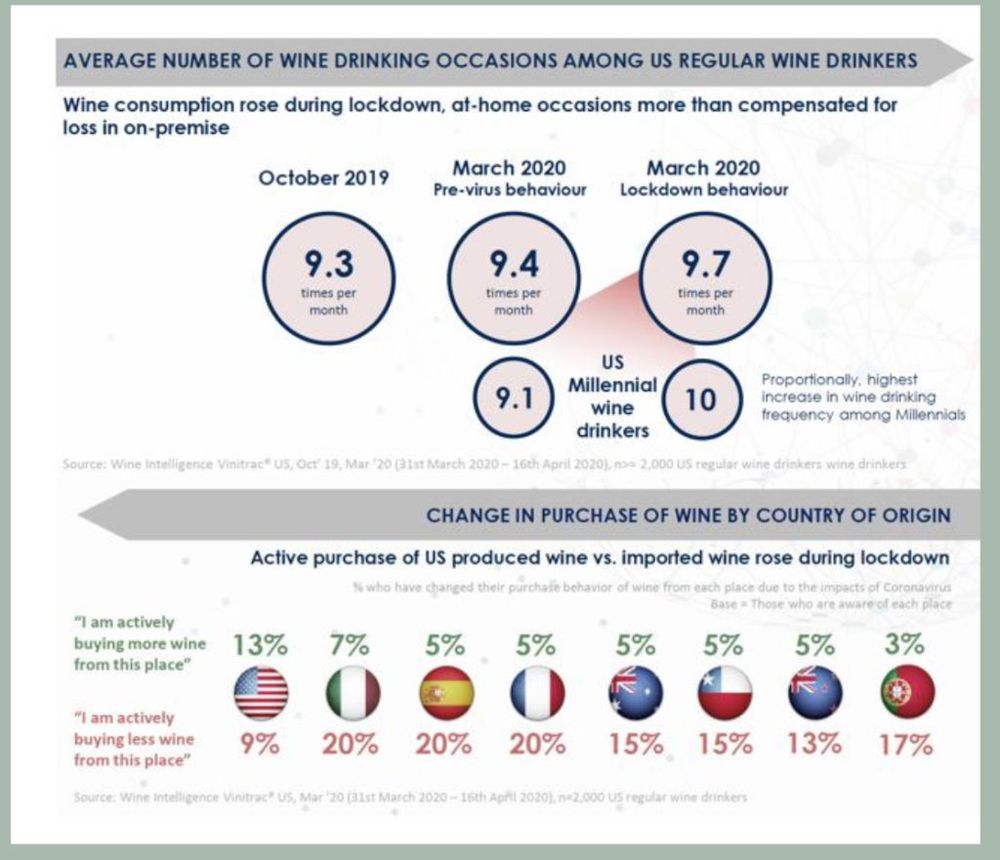
Morgan Stanley’s future forecasts for drinks industry

Morgan Stanley: The US investment bank has set out what it sees as a ‘new normal’ for the drinks industry. Although it stresses “it is too soon to predict with any certainty” it goes on to pick out three main future trends:
- prolonged consumption shift from on-trade to off-trade as consumers continue to be reluctant to visit crowded places post lockdown, combined with a desire to save money in what is already a fast emerging global recession – there will also be less restaurants and bars to visit making the off-trade the place to be for strong alcohol sales.
- the shift to more mainstream brands and drinks that offer familiarity, reassurance, trust and value – which in turn will put a squeeze on premiumisation across all drinks categories, particularly as the economy contracts even more and there is less money and confidence amongst consumers.
- a greater urgency in building strong e-commerce and digital capabilities.
Morgan Stanley also points to the latest US Nielsen numbers that show there was a 26% year-on-year increase in off-trade alcoholic sales for the nine weeks to May 2. With beer up 20%, wine 30% and spirits up 34%. It points to major brands, such as Campari, seeing this as evidence of a “sustainable shift in consumption patterns”.
“Off-premise channel represents around 70-80% of the consumption in the US for most beer and spirits categories; so continuation of these growth trends would be a welcome upside risk,” it said.”
It has also assessed what it sees as the “gradual” recovery under way in China, with alcohol volumes down 17% in April vs 47% in Q1. It adds: Carlsberg noted ‘volumes coming back’ at the beginning of April and Pernod sees improving reopening rates in the on-premise – but footfall remains light. We forecast stabilisation in China by Q3 and positive year-on-year sales growth by Q4, but we are mindful that the recovery could be gradual. “Chinese consumers are still cautious about going out to restaurants (46% of respondents) for leisure (33%) and 71% for visiting shopping malls.
Online sales continue to beat records
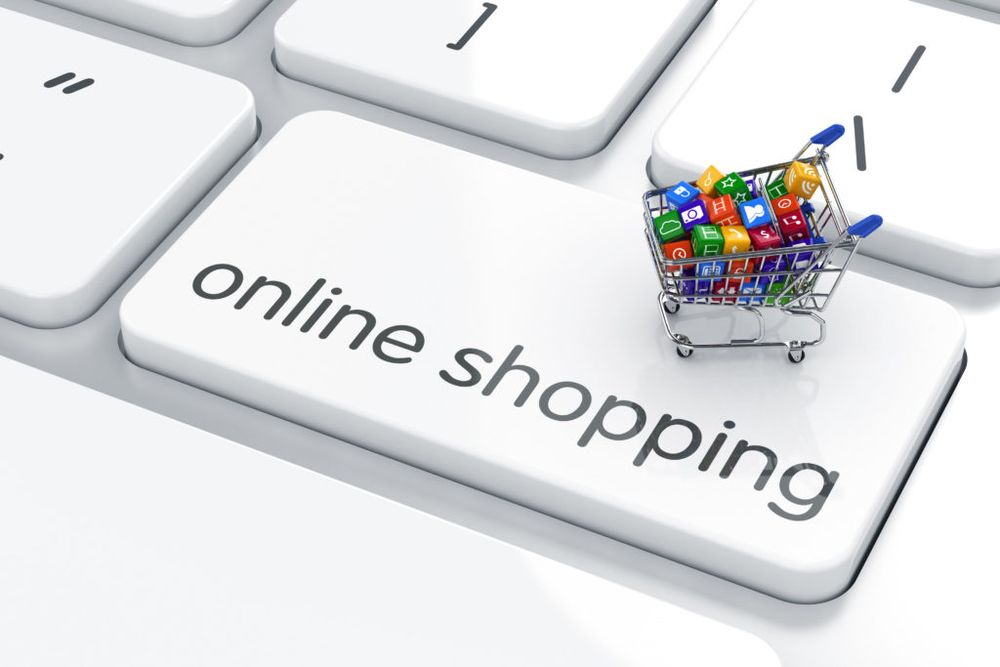
Ecommerce should be seen as a part of your digital strategy
The move to online continues at such a pace at that the latest figures from IMRG Capgemini show we are now at a 10-year high for consumers buying goods online. Its Online Retail Index that tracks 200 retailers shows that:
- Online retail sales growth was up 23.8% year-on-year in April.
- This compares to 5.95 growth over the last 12 months, 6.4% for six months and 6.2% for the last three months and 28% up on March.
- Noticeably it is multichannel retailers that are benefiting the most with more sales than dedicated online players with growth of 35.8% vs 8.3%.
IMRG Capgemini describes the changes in April as “a seismic shift in purchasing patterns”. Key growth categories were: gardening up 288% in April; electrical sales 102%; and health & beauty up 82%. Clothing sales were down 23.8% from April 2019 with footwear down 31% and and menswear 33%.
Lucy Gibbs, managing consultant at IMRG, says: “COVID-19 has reshaped consumer spending patterns and shopping habits. Customers have become accustomed to turning to online to fulfil shopping needs as non-essential retailers remained closed.”
But she expects this could in the long run be an advantage for budget, value brands as well as brands that people know and trust. “This can result in a squeeze in the mid-tier where appealing to both needs has been traditionally harder to balance. Retailers will need to listen to their customers, and find new ways to become increasingly transparent, flexible and innovative in order to navigate the rocky and uncertain road ahead.
Porto Protocol’s latest Climate Change Debate on Organic and Biodynamic Viticulture: 5pm
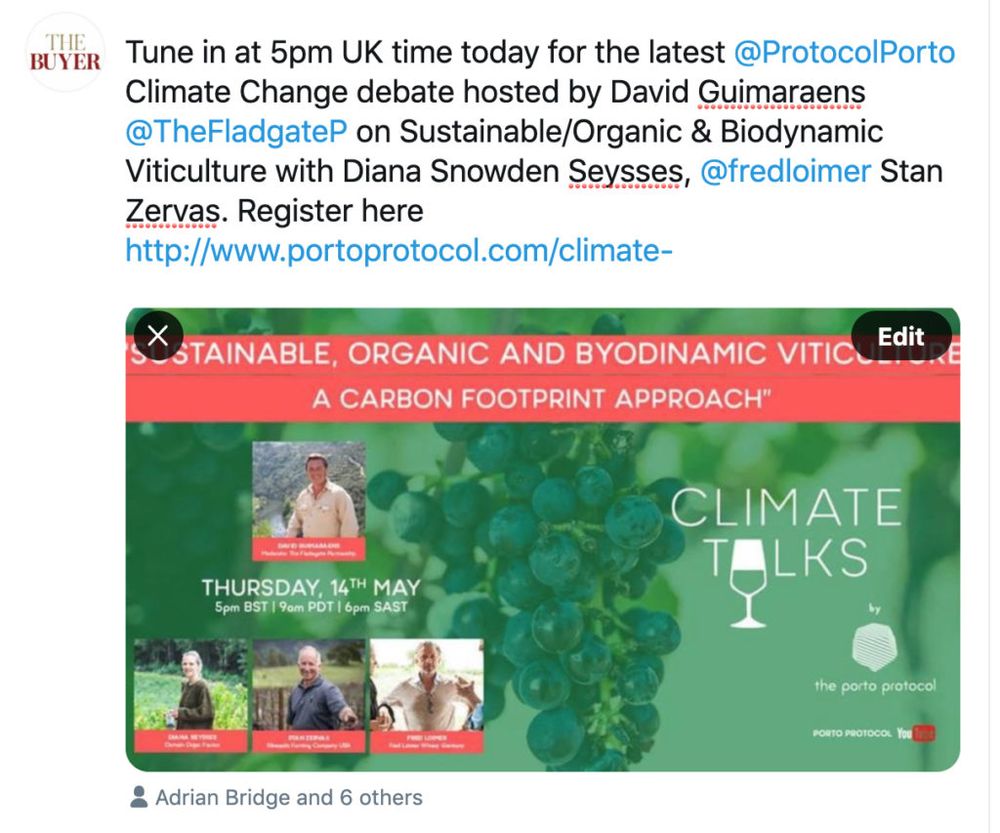
May 12
Klopp: “We are never more apart from each other and never closer together”.

Jurgen Klopp finds the right words…again
Whether you are a Liverpool football fan or not, you have to admire its manager’s ability to find the right words to say at the right time. In fact, so often does Jurgen Klopp capture the moment just in a few words that there are thousands of fans walking around the world with one of his sound bites on a T-shirt.
When the football season was suspended in mid March, Klopp issued a statement with these simple but effective words: “I’ve said before that football always seems the most important of the least important things. Today, football and football matches really aren’t important at all.”
Now that we are heading into our third month of lockdown he has been calling up fans to wish them the best with a line very much in keeping with Liverpool’s famous “You’ll Never Walk Line” mantra. As he says: “We are never more apart from each other and never closer together.”
In fact, perhaps the government when it is looking for its next slogan, rather than “stay alert” they could take a lesson or two from what Klopp says next: “We are never more apart from each other and never closer together, because we all have the same life, we are all at home…but we will go again and we will be back.”
If you want a lift (even if you’re not a Liverpool fan) then click on the video below.
Jurgen Klopp “We are never more apart from each other and never closer together.” pic.twitter.com/TPoJBXarMG
— The Redmen TV (@TheRedmenTV) May 12, 2020
Furlough scheme to be extended to end of October but employers will soon share some of the cost

Chancellor Rishi Sunak will have brought relief to companies and staff alike with the news the furlough scheme is to be extended to October
Whilst on the hand the government is keen to get as many people as it can safely back to work, the reality is it also realises this is going to be a long haul for the majority of the UK. That was confirmed today with the news the Coronavirus Job Retention Scheme is being extended by another four months until the end of October.
The announcement will come as a big relief to those companies and employees worried that they could be creeping towards a cliff edge of the initial deadline that was due to run out at the end of June. What’s more the government has continued its pledge to pay 80% of the salary 80% of anyone on the furlough scheme, up to a maximum of £2,500. It is thought the scheme is supporting some 7.5 million people.
In a statement at the House of Commons today, the Chancellor Rishi Sunak confirmed the scheme “will continue for all sectors and regions of the UK, but with greater flexibility to support the transition back to work”.
Which means there will, from August, be some changes to how it operates including allowing employers to bring furloughed employees back part-time and therefore sharing their salary with the government’s payments. There will be further relaxations announced that will make it easier for workers and their companies to bring people back into work on a gradual, phased basis.
“We are doing everything we can to protect everyone currently unable to work. As we reopen the economy we will need to support people back to work,” said Sunak.
So whilst the 80% commitment remains, it appears more of that share will be expected to come from employers down the line: “The level of support that people receive won’t change but that will be shared between the government and employers,” added Sunak.
The British Chambers of Commerce said the move would bring “significant relief” to employers and workers.
IWSR: We could be in for a worse global recession than after 2008’s financial crash

Look away now…we could be in for a worse recession than what came in 2009 according to the IWSR
We could all be on course for an even deeper and more long-lasting global recession to the one that followed the 2008 financial crash, according to IWSR, the international drinks analysts, IWSR.
The big difference this time is that the world will not have the so called BRIC countries – Brazil, Russia, India and China – to come to the rescue thanks to what was at the time their enormous growth that helped kickstart economies across the rest of the world. The IWSR claims alcohol consumption would have been 2% rather than being flat with out the “contributions of the BRIC nations, where consumption volumes rose 3.7% in 2009”.
Now clearly there was a lot more to the recovery than that, but IWSR says the “BRIC markets provided a much-needed silver lining” which does not look like being there in the same degree in the coming years.
The IWSR says that whilst there are some similarities between the conditions in 2008 and now, such as increased at-home consumption, price stagnation and falling beer sales, there are also marked differences. Particularly around international travel and the ability to do business even if you can due to what could be further lockdowns and outbreaks of Covid-19 down the line
“China is likely to provide a boost, especially if no further outbreak occurs, but Russia, India and Brazil will likely not provide as much of the demand this time around,” says IWSR chief executive, Mark Meek. “The new ‘BRIC’ is Africa and I suspect that this region will be heavily affected by the low price of oil and the impending Covid-19 crisis likely to develop across the continent.”
In other news…
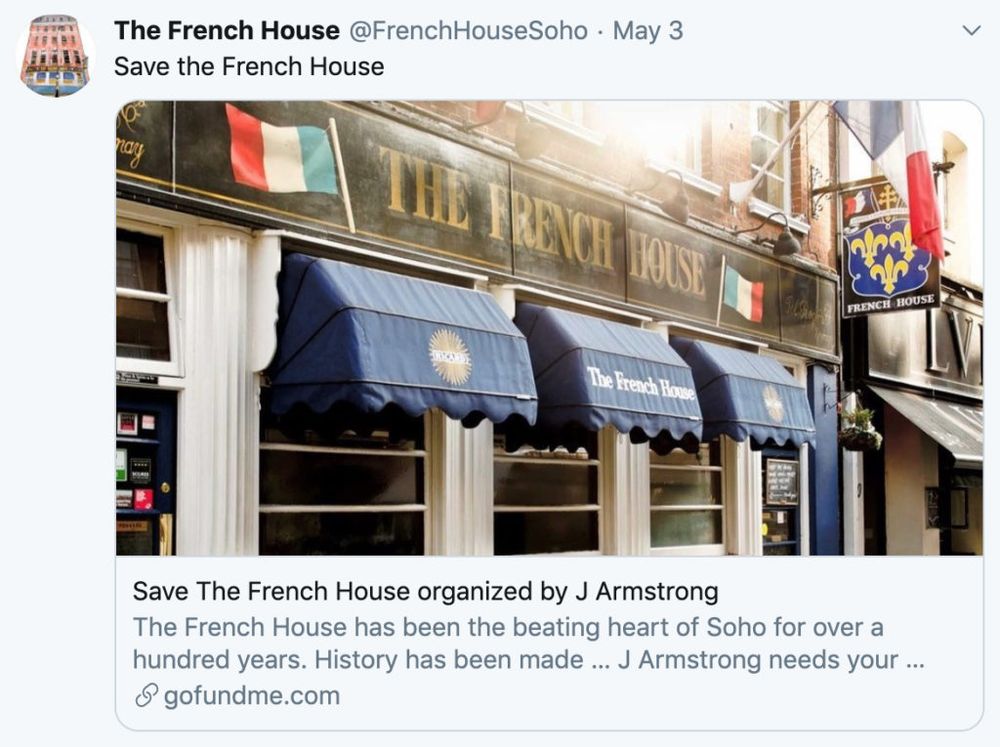
- The much loved French House in Soho is close to collapse and has started a campaign to try and keep it in business. It has already raised£50,000 but needs to raise close to £90,000 or more to keep it going during the lockdown. If you want you like to support this iconic pub loved by actors, and the Soho community then please click here to donate.
- More than 33 million Americans have now filed for unemployment.
- UK financial regulators say that two-thirds of initiatives for the next year have been delayed by the pandemic.
- Facebook and Google will allow employees to work from home for the rest of the year.
- Anheuser-Busch InBev, the world’s largest beer maker, including the Corona brand, expects a “materially worse” second quarter as the impact of Covid-19 hits its major markets around the world. It says it sold 9.3% less beer and other brands than a year ago in the first three months of 2020, but sales were far worse in April. It hopes for some recovery in China where drinks volumes were down 46.5% in January-March, but only 17% lower in April.
Say thanks to hospitality workers and bar staff and buy Aviation Gin
If you are looking to stock up on gin in the coming days then perhaps give Aviation gin a go, for the Ryan Reynolds backed brand is continuing to donate 30% of profits in the UK to The Drinks Trust and bar tenders charities in the US. And they have made this nice, little funny advert too. It’s available through Master of Malt.
May 11
July 4 could be the day that some of the hospitality sector can re-open
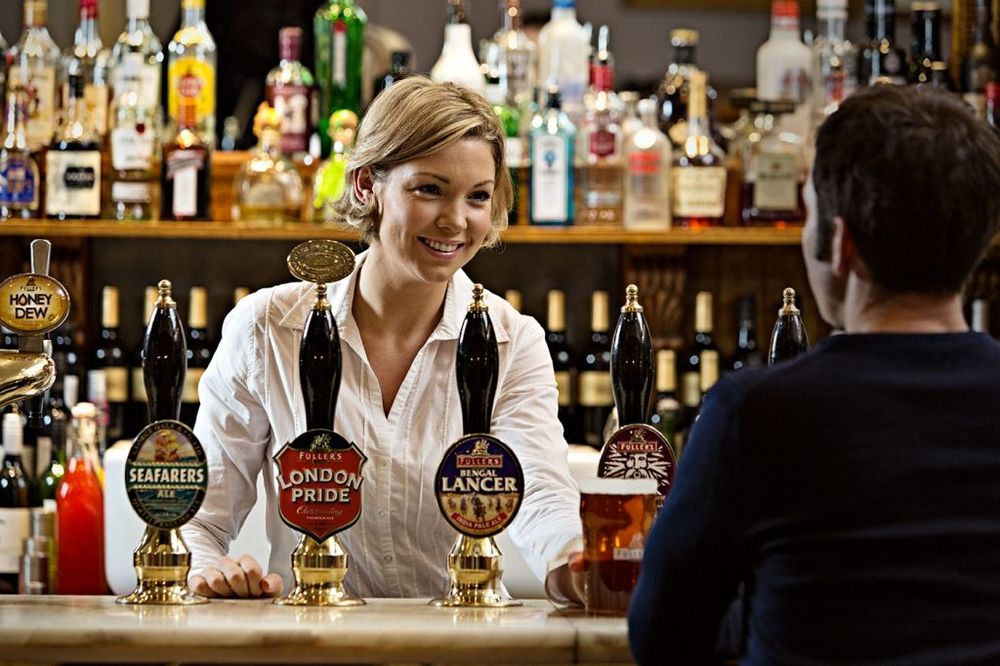
Will we get the chance to re-open and go back to pubs in July?
It’s a big ‘could’ but according to the government’s latest lockdown guidance, parts of the hospitality sector might be able to re-open on July 4. But that will only be if the five key factors the government uses to assess how safe the conditions are in the country. The framework is, however, there and restaurants and bars have, at least, a deadline and a date to start planning their recovery from.
Whether many outlets will open even if they can remains to be seen, but the Prime Minister’s announcements last night, and then in the House of Commons this afternoon, has moved the agenda along.
The guidance says that while “all workers who cannot work from home should travel to work if their workplace is open … the only exceptions to this are those workplaces such as hospitality and nonessential retail which during this first step the government is requiring to remain closed”.
But then food service providers, pubs and hotels will be able to open from July 4 along with hairdressers, churches and leisure facilities like cinemas.
The document says: “Some venues which are, by design, crowded and where it may prove difficult to enact distancing may still not be able to re-open safely at this point, or may be able to open safely only in part. Nevertheless the government will wish to open as many businesses and public places as the data and information at the time allows.”
Any re-openings will be done in a phased way with “pilot re-openings to test their ability to adopt the new Covid-19 Secure guidelines”. It says: “The government will also monitor carefully the effects of reopening other similar establishments elsewhere in the world, as this happens.”
The trade has started to respond to the news. Emma McClarkin, chief executive of the British Beer and Pub Association, said: “The government needs to ensure that further ongoing support is provided for Britain’s pubs, and the brewers that supply them, so that when the time comes for reopening our sector is best prepared to do so in a safe and sustainable way.”
How ‘livestreaming’ will become the norm for selling online and going DTC

“We go live to…” Livestreaming can take online shoppers direct to a farmer’s land, a winemakers vineyard allowing shoppers to buy direct
We might all be familiar with the idea of ‘streaming’ movies, or various other downloads, to keep ourselves entertained during lockdown, but it seems ‘livestreaming’ is going to become a regular part of how we shop in the future now that online has become such a key part of our lives.
Up to now livestreaming has been much the domain of the ‘influencer’ and the hordes of people, usually of the younger variety, who will happily sit and watch someone getting up to something else on social media.
But as online shopping has become the only way that some goods and services can actually be bought and sold, consumers are going to want to find out more about what they are buying and what better than actually seeing, and potentially talking to, the person who has made it. As they talk you through how to use it, wear it, or drink or eat it.
Livestreaming can fill the gap for those products that usually rely on a consumer visiting a store to see and touch a product for themselves. Like a car, a sofa, a table and chairs, a new smart cooker. It is already part of every day shopping in China where Alibaba has allowed its customers to virtually shop whole high streets of digital shops through augmented reality.
Livestreaming takes that experience to the next level as you can both retail and entertain at the same time. When Covid-19 broke out in China, Alibaba’s Taobao Live livestreaming platform saw a 700% increase in the number of retailers using it between January and February. The Shanghai Fashion Week in late March was all livestreamed allowing viewers to pre-order the clothes the models were wearing on the catwalk.
Transforming sales for farmers and producers

Livestreaming in lockdown has transformed the lives of Chinese farmers
Farmers have been using the channel to livestream straight from their fields of mangoes selling their crops live onliine.
We can expect other major online retailers and brands to turn to livestreaming as not only allows companies to take consumers right to the factory floor, as it were, it suits the mentality of shoppers who may be unwilling to go to main shopping centres post lockdown.
It’s the ideal platform for wine producers and winemakers to talk directly to customers all over the word, with online links connecting them to the suppliers, merchants and retailers selling their wines in their country. Fitting neatly into the new generation of consumer that will want to use technology to help them browse online and find out more about what they are buying.
Taobao now has over 50,000 rural live-streamers and aims for at least 200,000 more within the year. The crisis has changed the business models for growers who were selling 90% of their produce offline are now selling 90% online. When on April 15 Wuhan was able to open up again rural live streams helped collectively sell more than RMB60 million ($8.5 million) worth of agricultural products from Hubei, the city’s province.
Taobao now says it aims to generate RMB15 billion (£1.7 billion) in agricultural sales via live-streaming within the year.
New Podcast: The Italian Job with Paul Caputo – in partnership with The Buyer

The Buyer is delighted to be sponsoring and linking up with a new wine podcast from writer and wine merchant, Paul Caputo that is all about keeping you up to date with what is happening in the overall wine scene, but with a particular focus on Italy. The suitably named ‘The Italian Job’ will look to follow closely what is happening in each of the country’s main wine regions, talking to producers, winemakers and importers. First up is an interview with Nik Darlington of Graft Wine and why Italian wine is so important to its portfolio, plus how it is coping with Covid-19, whilst The Buyer’s Richard Siddle gives his take on what impact the lockdown is having on the wine industry in general.
Caputo says: “I’m excited to make this a fun but informative window into the world of Italian wine. I’m hoping to pack it with conversations from the industry’s key figures as well as up and coming voices. Expect to go off the beaten path and explore some of Italy’s more obscure varieties.”
You can take a listen to the first episode here and you can subscribe on Spotify.
Academics assess when it is going to be safe and viable for the on-trade to re-open
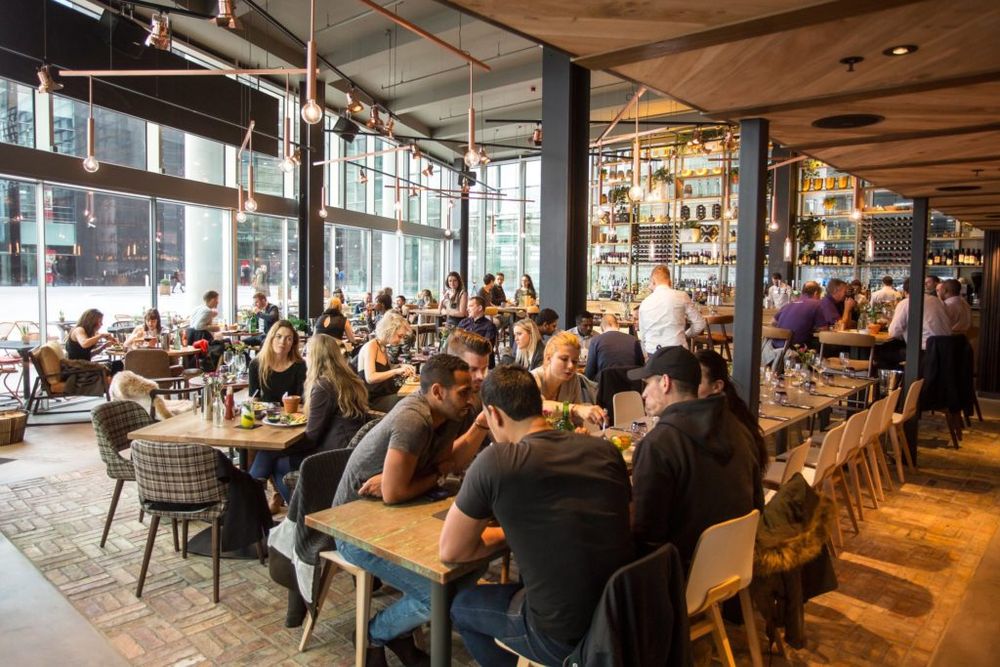
It will be a long time before we will be able to see a sight like this in restaurants
Restaurateurs and bar owners scratching their heads wondering when it is going to be both safe, but also economic to open their doors might want to follow the research of a new project at the University of Stirling which is analysing just that. It is carrying out a viability test to see when licensed premises are best placed to re-open.
The project is being funded by the Scottish government and will look at a wide range of implications, including consumption, intoxication and violence, says a BBC report. Professor Niamh Fitzgerald, the lead researcher, said: “We will consult with a wide range of businesses, staff, policymakers and experts. One option could be to ease restrictions partially, or in a staggered way, potentially with measures remaining in place around sales, opening hours or venue capacities to minimise harm and impact on the emergency services.
“Governments and the public are very interested in how licensed premises may begin to reopen – but there are risks involved. Whenever restrictions ease, businesses may seek to recoup losses and customers may choose to celebrate by drinking more than usual.The actions of businesses and consumers could have implications for how intoxicated people get, and have a knock-on impact on our emergency services.”
Behind the Wines with Randall Grahm, Bonny Doon Vineyard

Randall Grahm will be sharing his winemaking stories on Zoom on May 12 at 6pm
Tomorrow you can join Elaine Chukan Brown as she interviews the influential and charismatic Randall Grahm, founder and winemaker at California’s Bonny Doon Vineyard as part of the Wine Institute of California’s on-going “Behind the Wines” Zoom talking to leading California producers. He will share stories about his career and, in particular, his role in building the reputation of Rhône varieties in California. It will also be a chance to hear first hand about his decision to move away from owning Bonny Doon, the vineyard that made his name, and how he is now exploring new projects, including looking at new grape varieties with his “Popelouchum” project. It takes place at 6pm in the UK. You can register to take part on Zoom here.
Brewdog’s 10 ways back to re-opening
Here’s a typically to the point tweet from Brewdog on how it suggests it will re-open its bars post lockdown.
It’s such a challenging time for hospitality.
We long for the day when our team are back in our bars, serving world class craft beer again.
Whilst we await official guidance, here are 10 things, which will help us welcome customers back when it is safe to do so. pic.twitter.com/HwDSQ5mmeB
— BrewDog (@BrewDog) May 7, 2020
Grain to Grape: Supermarket Series
Harry Crowther, restaurant consultant and wine educator, and the man behind the Grain to Grape website, and series of training modules that teach bar staff about wine, has started a new Instagram Live tasting series where delves into different wines from the major supermarkets. First up was his pick of Tesco’s wines.
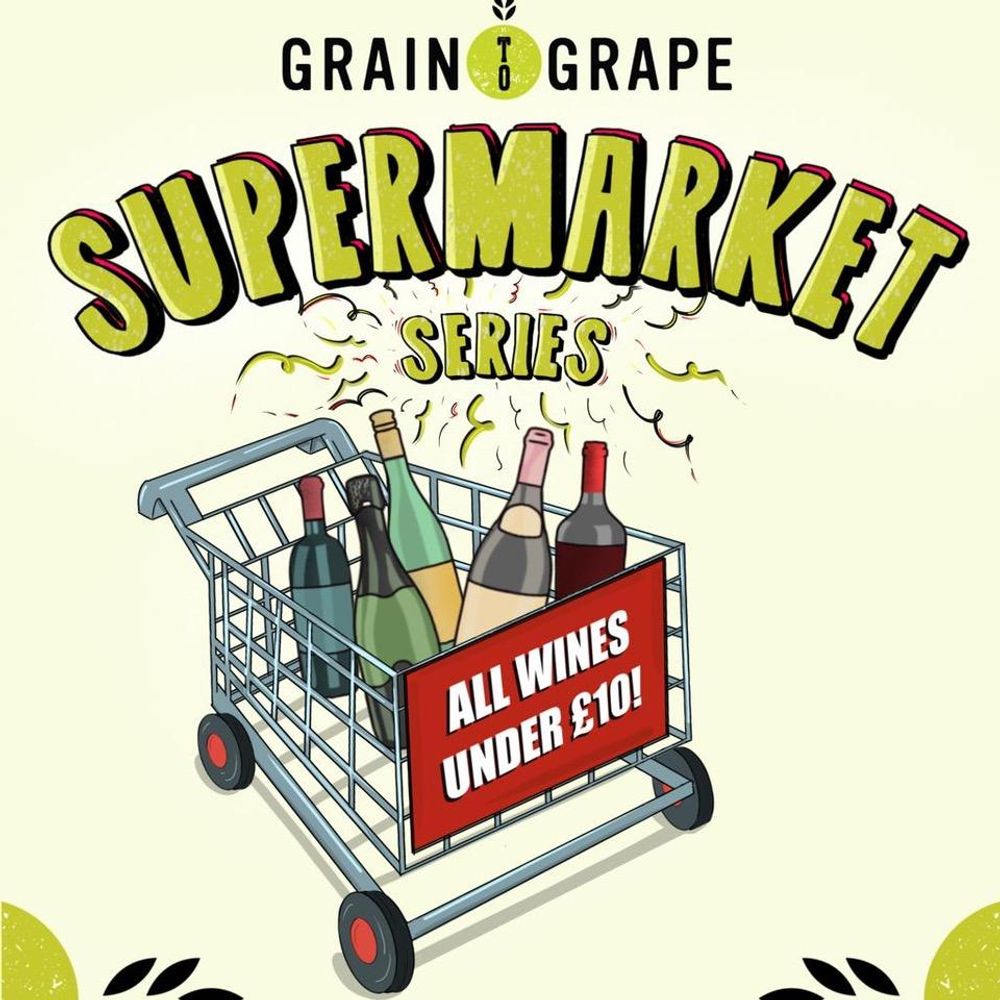
Coming up – all at 5pm – are:
May 13: Lidl; May 16: Aldi; May 19: Asda; May 22: Sainsbury’s; May 25: Marks & Spencer; May 28.5.20 Co-op; and May 31 Waitrose.
5 ways to improve your leadership skills

There’s always room for improvement no matter how experienced you are as a leader
Now is a great time to use any spare time you have to help with your business learning and wine skills with plenty of people signing up to online courses. Here’s an opportunity to do just that and look to improve your own leadership skills with the first in what is going to be a regular series of short management improvement guides written by professional development and management trainer, David Otter, available on Amazon Kindle.
In this report he looks at ‘5 Ways To Be a Better Leader: Practical Leadership Skills‘.
Otter explains his approach: “I believe that better people make better organisations possible. So, I work with organisations, leaders, managers, supervisors, employees and individuals to help them understand what ‘better’ looks like. I believe in achieving what is possible, will help you understand what possible could be and how it can be achieved. I’m realistic, not tempted to chase what is currently unachievable only what is possible.”
He adds: “We are living in a world where strong and purposeful leadership is more and more in demand, yet we seem to pay lip service, at best, to the notion that these leadership skills can or should be developed.”
This series of “practical self-help guides”, can, he says, “be read and used in isolation, they also cover inter-related subjects so working on each book in sequence will develop your knowledge, understanding and skills to help you become the best you can be”.
You can check out the other guides he has written here.
May 8
Global and UK consumer changes in behaviour and attitudes
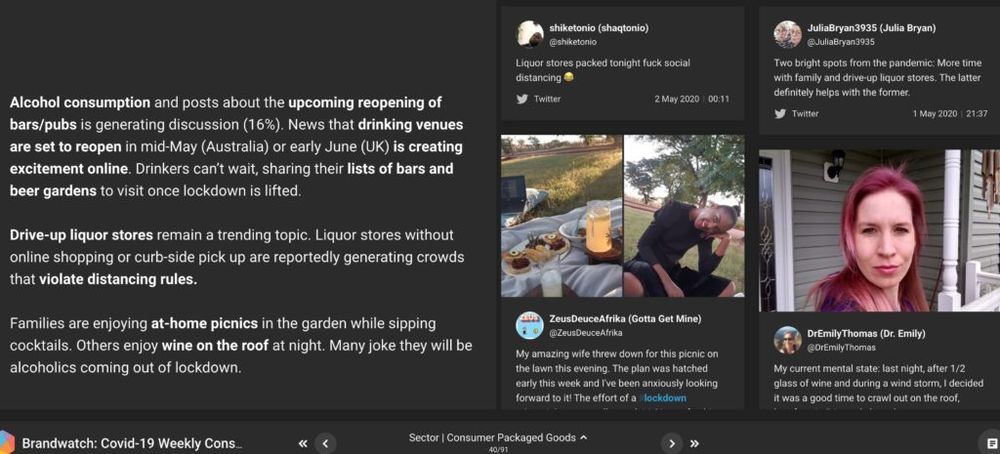
Brandwatch’s global analysis of consumer attitudes towards Covid-19 and their lifestyles and shopping behaviour
So just how fast are consumer attitudes and behaviours changing as we all go through our collective lockdowns in countries all over the world? Well Brandwatch’s latest consumer attitudes research is a good place to start. It covers what is going on in consumers’ heads in eight key markets – the UK, US, China, Germany, Italy, Spain, France and Australia. Its latest analysis is for the week up to May 3. With 1,000 consumers interviewed in each country. It has found the following key trends emerging from their interviews, but also from monitoring social media channels:
Alcohol and consumer trends
- Brandwatch’s research that 16% of all consumer posts are around alcohol, how much people are drinking and potential excitement of bars and pubs opening again. Australian and UK consumers are sharing pictures of favourite beer gardens and pubs to visit.
- Home delivery and drive up kerbside delivery are also trending.
- 11% of all posts are about online shopping and delivery with consumers clearly aware of which retailers, and brands that are switching to online.
- People are also sharing posts of the premium cocktails they have made and unusual places at home where they are drinking, with wine drinking on the roof.
- 8% of posts are about supporting local businesses and encouraging more to open.
- 49% of people say they are eating less junk food than the 22%who said they were. Other than the US where 28% say they are eating more than the 24% who said less.
- Setting up home entertainment to watch films at home is 8% of all posts
- A recording of Benedict Cumberbatch playing Frankenstein at the National Theatre has had 2m views on YouTube.
- 7% of posts are about virtual experiences people have found online like museum, and tourism site tours.
It seems sleep is a problem right around the world. So if you are having intense dreams, and feel like you are going into your own version of Christopher Nolan’s Inception every night, then you are not alone. As this chart shows.
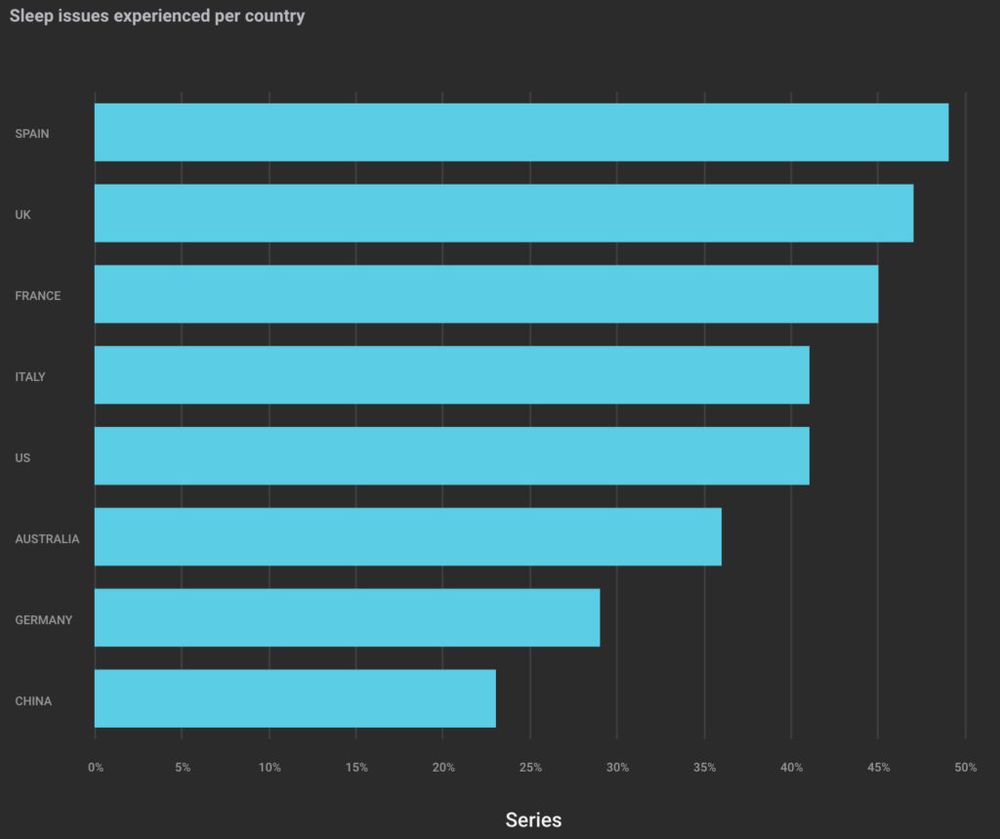
Confidence and working trends
- Ahead of a potential relaxation of lockdown rules next week, UK consumer are still steadfastly behind them with only 15% seeing them as being excessive.
- Overall 49% of people think their country’s lockdown measures are fair.
- New Zealand’s positive response to the pandemic is trending around the world with the news it claims to have “eliminated” the virus. Many see it as a confidence booster for what might happen in their country.
- There has been a rise in concern about unemployment, of which 42% of the social chat is around what benefits will be available and the lack of support there is currently for people out of work.
- 34% of Chinese consumers are now more worried about their employment prospects than they were in April – when it was 28%.
- People have got used to working from home and they like it. More workers will want the choice of woking from home in the future.
- But working from home is extending people’s average working days by two to three hours.
- One in four posts about consumer products relate to haircare and hair style
- Consumers are interested in new technology and apps that will help protect them and monitor their health.
- The number of posts about contact tracing technology has gone from less than 5k on March 30 to over 20k on April 27.
If you go down to the beach today…beware the Grim Reaper
Now there is one thing getting a ticking off by the police, or even a small fine, for breaking lockdown rules, but you might think more than twice before getting a rug out to sit on in the park, or popping over to your mates for dinner, if the Grim Reaper turned up ordering you to go home.
But that was the sight that confronted sunbathers on Miramar beach in north Florida this week when an enterprising, and clearly very media savvy, local lawyer, hired a Grim Reaper costume to parade up and down the beach warning locals of the dangers in their ways.
It was all the work of Florida lawyer, Daniel Uhlfelder, who reacted to the local authority’s decision to re-open the beaches from lockdown by not just starting the locals but taking his message to the local media.
This one news video has already had 10m views around the world. Let’s hope they actually took notice of what he was saying.
Wine Intelligence’s Lulie Halstead on US consumer drinking trends

As the world’s biggest alcohol market it pays to keep close attention to what is happening in terms of what consumers are drinking, not drinking or about to drink. Which is essentially what Wine Intelligence’s latest research on US consumers in the pandemic is all about.
Lulie Halstead, Wine Intelligence’s chief executive, has also taken to Linked-in to give her take on the key findings from the research which she says reminds her of people’s reactions to a major trauma and how sufferers from post-traumatic-stress-behaviour can really struggle with what is referred to “shattered assumptions” and the realisation that aspects of your life you thought you could rely on are now no longer the case.
As she explains: “A recurring theme in the trauma therapy literature is the ‘focus on the familiar’. By re-establishing familiar routines, seeing people and doing things that you would normally do, it allows the mind to relax a bit and not focus solely on the trauma itself. Within this, we seek out supportive allies, which could be people, or activities, or even products – the friend who makes us laugh, the pick-up basketball game, that fast-food burger we always crave – that help keep us distracted and soothed.
“I wonder if some of this seeking of familiarity is behind some of the recent behaviours we have observed in the wine category. Our new report shows that those people who were committed wine drinkers before the pandemic have become even more committed during it, boosting off-premise sales volumes dramatically during March and April. The concern within the wine trade was that this was simply panic buying, which would create a huge sales ‘chasm’ straight afterwards, but this hasn’t happened. As to why, our data suggests that regular wine drinkers have found more occasions (and excuses) to reach for a glass of wine – the comfort of the familiar.”
She also explains why consumers now have a real focus on “local” businesses.
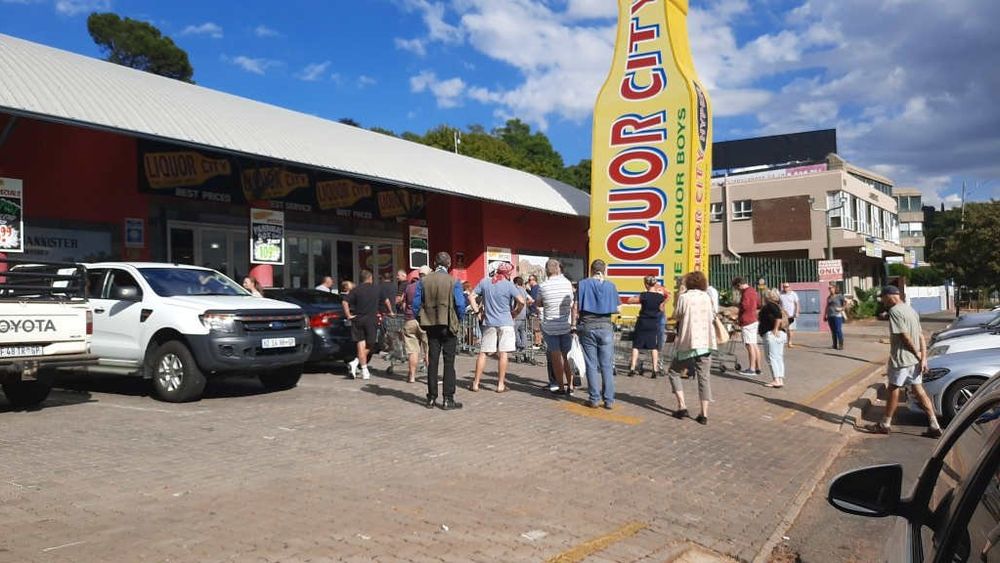
The US has seen a rush on alcohol and wine, but it is the domestic wines that shoppers are turning to
“In times of stress, our tendency as humans has always been to become inward looking and value our local (and national) communities – more true now in an era of lockdown and restrictions of movement. ‘Local’ consumers have the ability to buy direct more easily, visit more frequently as movement restrictions are lifted and feel engagement to support brands that are both physically and culturally closer to home.”
All of which means when coming to buying wine “there has been a notable shift” in buying “domestic wines and away from imports”. “Some 18% of our US respondents reported buying more wine from California and other US regions during this time, while 20% said they were buying less wine from France, Italy and Spain. Additionally, US wine drinkers increased their trust in California wines and conversely, lost trust most amongst Old World wines, particularly those from Italy.
“The group in the middle comprise the largest single segment – around 45% of our respondents. We have dubbed them ‘moderates’, and they appear to be following the prescription of post-trauma therapy very closely. From the limited perspective we have seen so far, they are ploughing onwards with the same relationship with their wine, same frequency, same brands, same occasions. The world may be going to hell in a handbasket, but the 6pm Chardonnay is still chilled.”
Porto Protocol Climate Talks
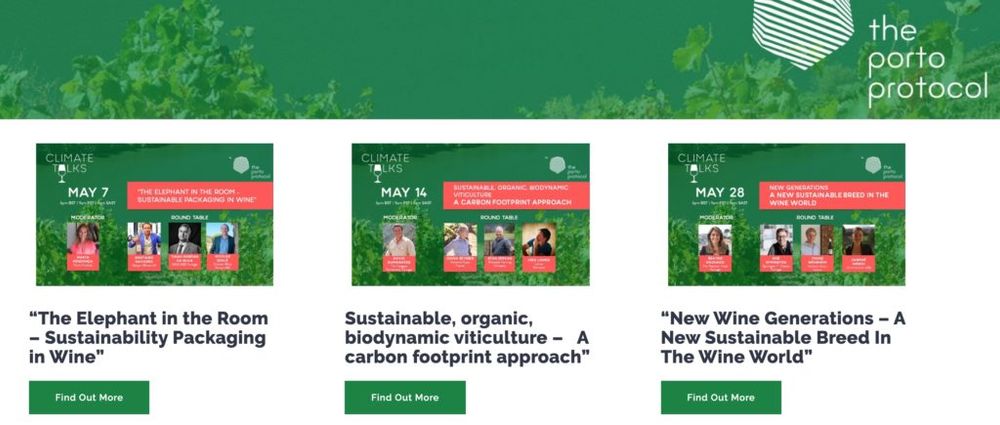
The issue of climate change has not gone any where during the global Covid-19 lockdown. In fact, if anything it has only gone to show what immediate changes can be made to the world’s eco systems if we all take the proverbial foot of the pedal. It is therefore a good time for the Porto Protocol, that looks to share, encourage and motivate the global wine industry to do more to tackle climate change to be holding a series of online Climate Talks on different environmental topics in the coming weeks.
The first session takes place today on May 7, with a focus on sustainable packaging. Future events include:
- May 14: Sustainable, organic and biodynamic viticulture – a carbon footprint approach.
- May 21: New Wine Generations – a new sustainable breed in the wine world.
To find out more and how to register then click here.
May 6
CGA: Up to 30% on-trade sites may not re-open post lockdown
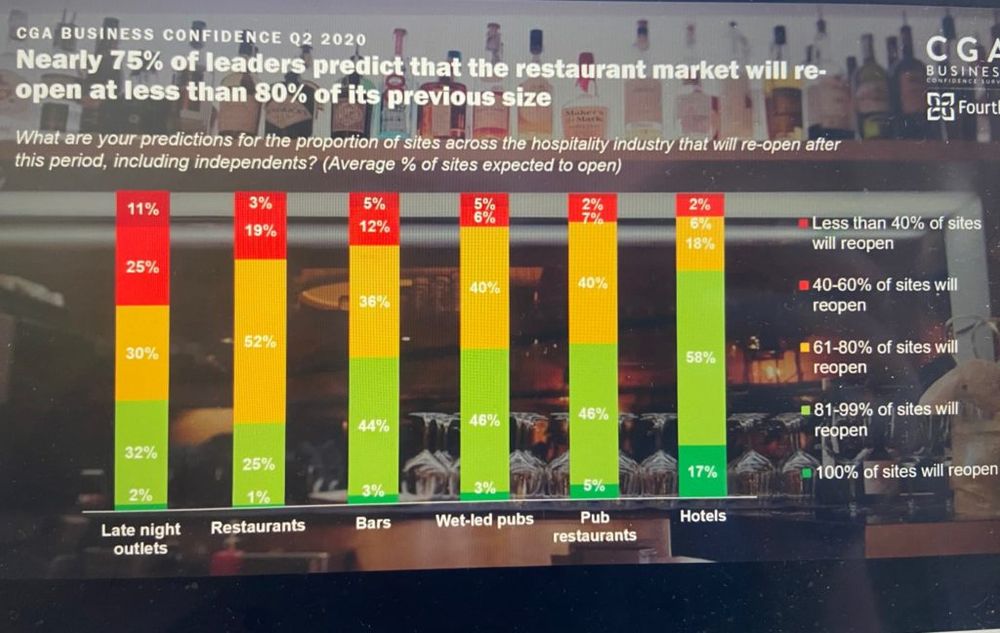
The fallout from the total lockdown of the on-trade sector could see between 20 to 30% of sites not opening. That’s the stark finding from CGA’s latest Business Confidence Survey of restaurant, bar and pub owners.
Its study reveals that despite efforts going on behind the scenes to try and do all they can to come back as strong as when they went into lockdown the combination of costs, debts, rents and uncertainty means the UK’s on-trade landscape is going to be dramatically different.
CGA also stresses these figures could even be worse as they cover what it defines as the ‘leaders’ in the sector and therefore best placed to recover and see the lockdown through.
The key findings show that:
- around 20-30% of all restaurants, bars, pubs and hotels will go out of business during this crisis.
- only 36% of on-trade leaders believe they will be able to open all their sites post lockdown and a third don’t know what they will do.
- 52% of business leaders are pessimistic.
- 70% want a nine month national rent free period to help them get through the crisis with only one in 20 planning on paying their rents in June.
- 83% of businesses have furloughed over 90% of their staff but 76% are not topping up furlough payments.
- operators will need to be able to guarantee 9% of their usual turnover in order to be in a position to open up again.
How to re-open
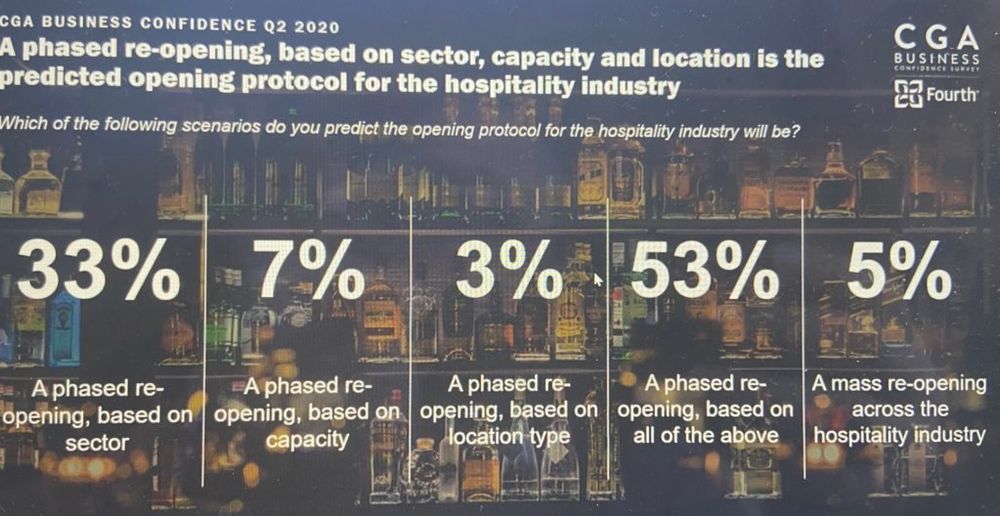
Behind the scenes measures are being ramped up to help prepare for a return to business as and when that might be. But there is already a clear split between those companies that believe they can be up and running again in a matter of days, and those who will require a much longer period.
There are hopes, says CGA, amongst some leaders that some sties could be open during June and July, but that is pure speculation. CGA shows that:
- 81% of businesses have started to put a re-opening plan in place.
- 4% said they could re-open immediately; 29% in less than a week; 15% in a week; 20% in two weeks and 22% two to four weeks.
New supplier terms
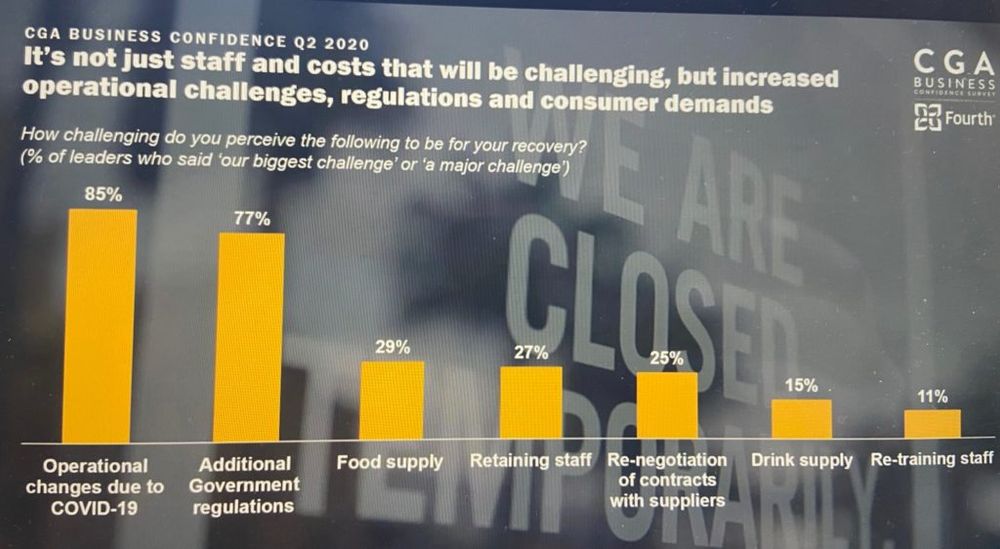
When they do re-open, drinks suppliers need to be prepared for changes. Up to a quarter expect to re-negotiate terms with suppliers, 15% will look at their drinks supply and 29% their food supply and 11% will need to re-train staff – 56% will reduce food items, and 22% will cut drinks menus and 33% will improve delivery services.
When it comes to readying staff for reopening, most bosses (63%) believe teams can be prepped and trained in less than a week, with 32% saying less than three days. There is, though, agreement that any return to business needs to be gradual and phased in and should be based on an operator’s ability to do so profitably. Until that point the government should do all it can to support the sector.
Key findings here include:
- 62% are looking at a phased reopening of their own sites.
- 73% are confident in accessing the funds needed to reopen.
- 36% want a three-month extension for the furlough scheme even when other sectors reopen.
- 50% of operators want the furlough scheme to be extended in three-month blocks – 40% would be happy with a monthly extension.
The research also shows that the numbers of on-trade outlets expected to do delivery is not as high as expected. It has either proved unsuccessful, or too costly to implement. Only 27% of businesses said they had sites open either for providing support to local communities and NHS (14%), for delivery (8%) and grocery and food supply to the public (4%).
Consumer concerns
The research also assessed how consumers are expected to return to the on-trade post lockdown:
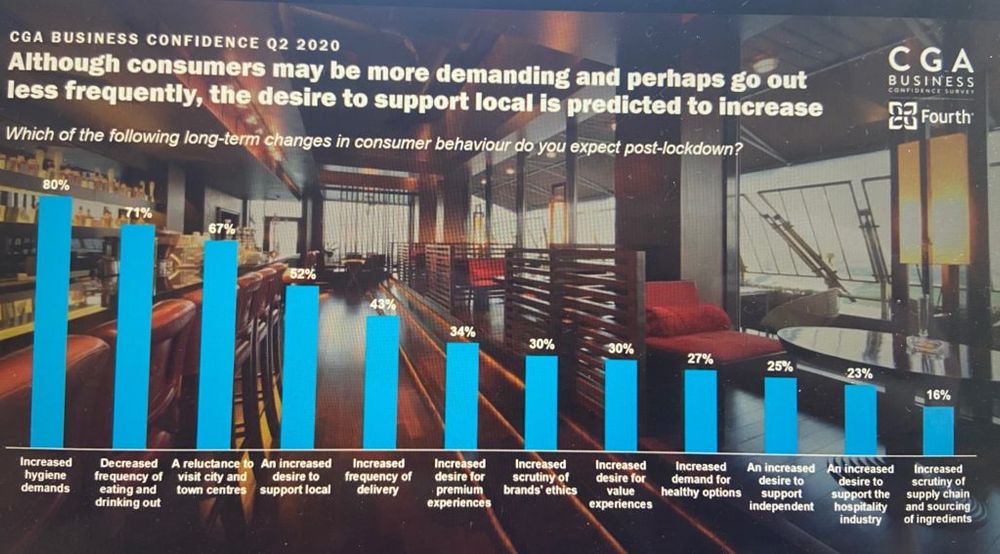
- the good news being two thirds expect frequency to be the same as before – eventually.
- 75% of consumers will not go back to chains that did not behave well during lockdown.
- conversely 75% will prioritise sites that did behave well and have worked with the NHS and local communities.
- 67% will be reluctant to go back to city centres long term.
- 43% will be looking to spend more on delivery.
- 34% will look for premium experiences.
- 30% will increase their scrutiny on brand ethics.
Vinoteca sees 400% increase in online sales with 50% new customers
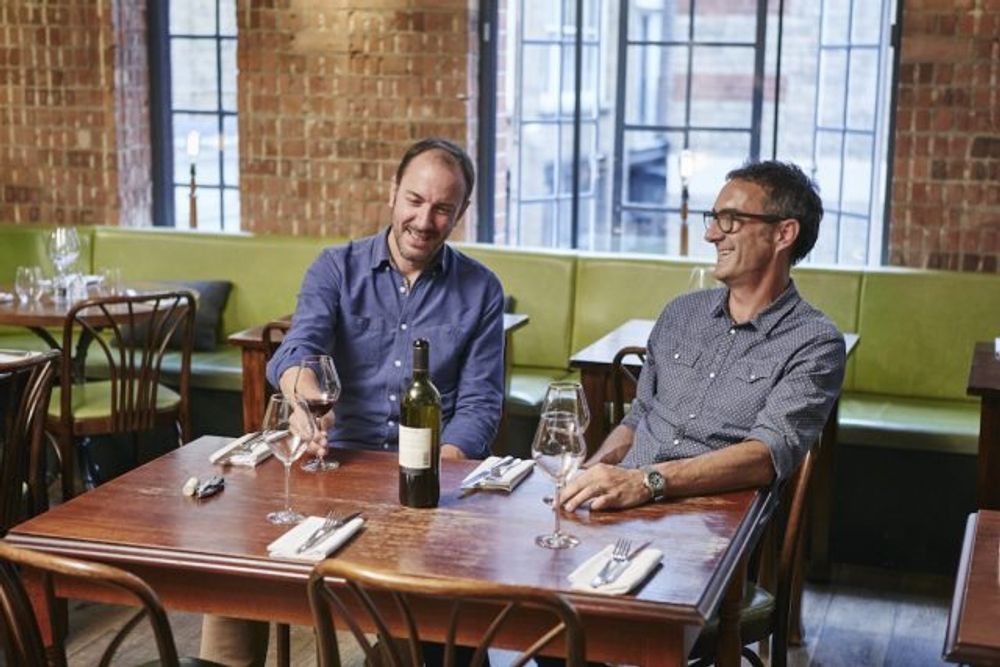
Vinoteca’s Charlie Young, left, and Brett Woonton have seen a surge in interest for its online sales and Wine Club during lockdown
Vinoteca, the trend setting hybrid wine bar and merchants group, may have had to close its sites during the lockdown, but has seen a 400% increase in sales from its online side of the business. What’s more up to half of the sales have come from new customers signing up to buy win from Vinoteca for the first time, said co-founder Charlie Young.
As a result he sees delivery and click and collect becoming a bigger part of the company when the lockdown starts to be lifted. “Yes, we think it will be,” he told The Buyer. Prior to lockdown online only accounted for 5% of its turnover.
“We are also trialling click & collect and delivery food items from our Chiswick Vinoteca – if that goes well we may well be able to incorporate that too post-lockdown,” he added.
It is using Parcel Force to be able to offer next day nationwide delivery at a time when more bigger online players are taking a up to a week to get wines delivered.
“We’ve consolidated the stock from all of our sites so for now we have enough stock to satisfy the demand. That will continue but we will need to start ordering from suppliers within the next few weeks,” he said.
“Online orders have increased very quickly. We’re seeing customers become more curious and adventurous, which we love,” said Young. “We’ve worked hard on creating an eclectic and entertaining collection of wines, which is really resonating with new customers.
His co-founder, Brett Woonton added: “We’re all missing the opportunity to be sociable; trying a new and interesting wine is a way of reminding ourselves what that feels like. We like to think of our wines as a holiday in a glass while we are all travel deprived! We’re engaging with customers by posting some crazy but informative wine tastings on Instagram which are great fun.”
Vinoteca’s online wine shop features its full range of over 200 wines, with wines from £8.50 per bottle to over £150. It has having particular success with larger formats including 5 litre bag-in-box for a Spanish red from Montsant and a rosé from Provence. It has also seen a rise in new members joining its Wine Club, which includes a monthly selection of six wines chosen by the two owners for £80.
Daily round-up of news and views
Armit’s At-Home Masterclass: Armit is running a second tasting masterclass for its customers as a way to bring them closer to their wines. This time the focus is going to be on Chardonnay and Bordeaux Blends. The Masterclass selection has been chosen by Armit’s Master Sommelier, Nicolas Clerc, who has recorded two masterclass, one on Chardonnay above, and one on Bordeaux Blends, for customers to sign into and watch. Ideally after having bought a case of the wines. The wines selected are: 2018 Chardonnay Banghoek Reserve, Delaire Graff, Stellenbosch, South Africa; 2015 Province Chardonnay, Astrolabe, Marlborough, New Zealand; 2013 Bourgogne Blanc, Maison de Montille, Burgundy, France; 2017 Le Volte dell’Ornellaia, Ornellaia, Tuscany, Italy; 2014 Ruhanui Organic, Stonecroft, Hawkes Bay, New Zealand; and 2013 G’Acte 5, Bordeaux Superior, Bordeaux, France. The case costs £115.
Ocado surge:Ocado is just one of the UK’s major online grocery players that are benefiting hugely from the nation’s desire to shop online and have their food, drinks and groceries delivered. It has reported today that its Q2 revenues to date are already up 40.4%. This, says Global Data is very much in keeping with its own forecasts that the overall online grocery market will grow by 25.5% in 2020.
UK high-street footfall: Overall high-street footfall figures show how far the general public has abided to the lockdown rules with an 80% drop compared to February, says Wireless Social. London is down about 70% compared with the average in February, but a little higher than March. Birmingham, Cardiff, Edinburgh and Manchester are down by about 90% compared with the average in February.
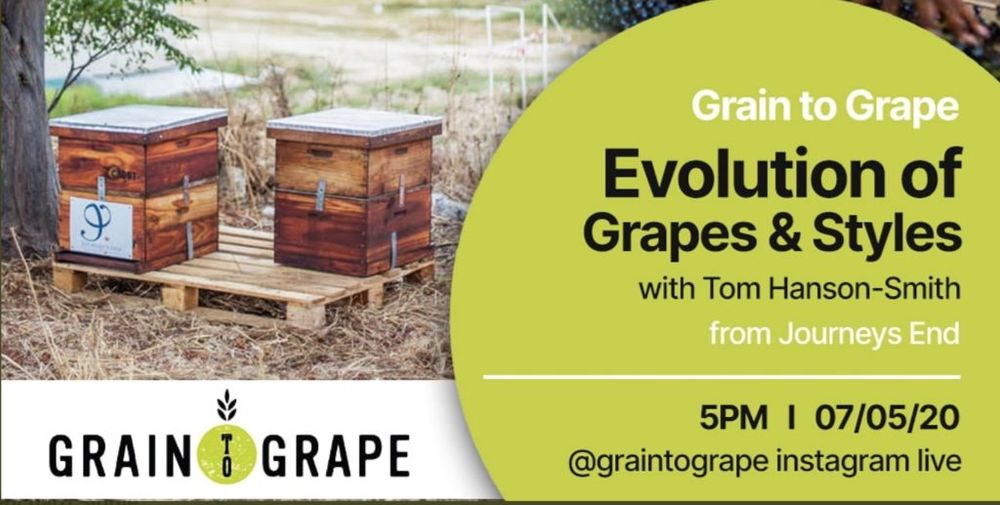
Grain to Grape: Harry Crowther is hosting his next Instagram live tasting and education class on @GraintoGrape on May 7 at 5pm. This time round he is helping to shine the light on South Africa and the evolution of its grapes and styles with a session with Tim Hansom-Smith, UK brand development manage, of Journeys End.
Churchill’s launches “Fortify a Friend”: Port house, Churchill’s, is giving people the chance to lift the spirits and share love between friends and family at this time with its ‘Fortify a Friend’ initiative. For anyone buying a six-bottle case of premium port from its website or a mixed case from the online Bar Douro Bottle Shop, Churchill’s will then send a free bottle of port to a nominated friend or family member, who people think need a little support or fortification – 10% of sales proceeds will be donated to Mind charity in the UK, and CASA in Porto, providing mental health support to vulnerable groups in isolation.
US off-trade boom: Off-trade sales in the US rose 30% in March to more than $2 billion. The figures combines off-premise scan data from outlets tracked by Nielsen with data on winery direct-to-consumer shipments (Wines Vines Analytics and Sovos ShipCompliant). Sales in the two channels were $2.43 bn combined, 30% up on $1.89 billion in March 2019.
Thursday. 8pm. It’s Majestic time…for some
When the Sunday Times’ columnist Rod Liddle turns his sights on you as a subject for a column, then you would be rise to run for the hills. He has a certain not quite so charming way of putting the proverbial boot in. So no doubt the collective blood pressures rose at Majestic this weekend when news came through that ‘the boy Liddle’ had decided to pick up on its online wine delivery service during lockdown. But as you can see from the cutting above, he had actually come to praise Majestic, and not throw its carefully delivered bottles in the nearest recycling bin. Mind you based on this, he will probably be first in the queue for the tip when we are allowed.
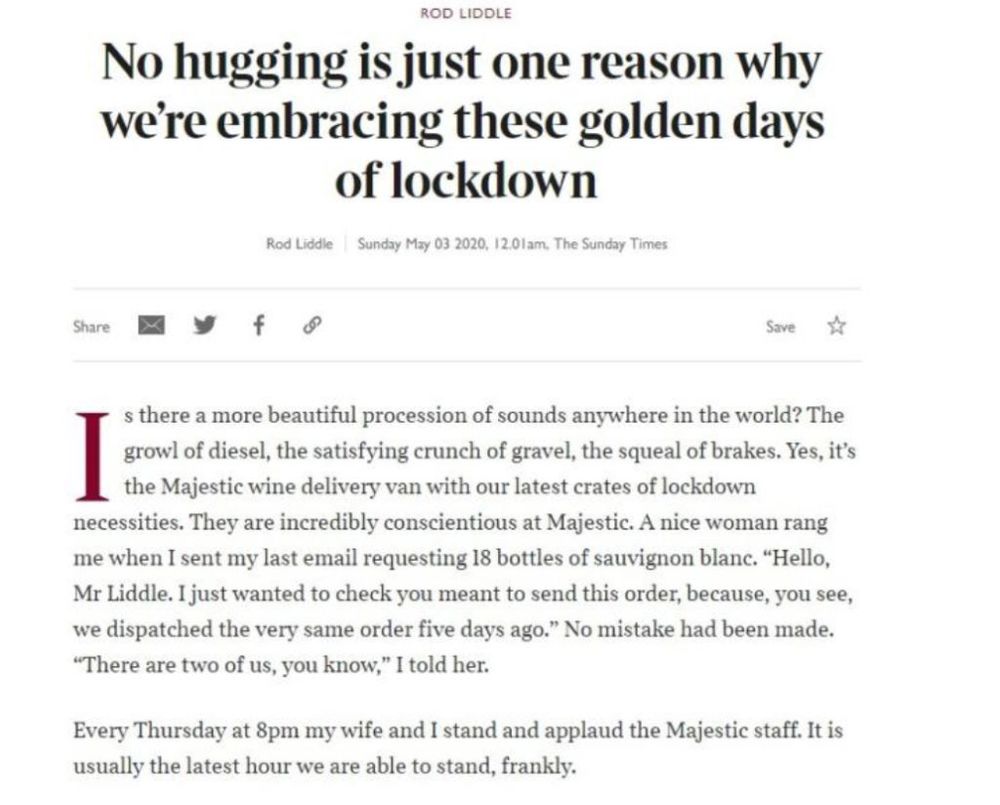
May 4
UK online grocery market to be up over 25% in 2020
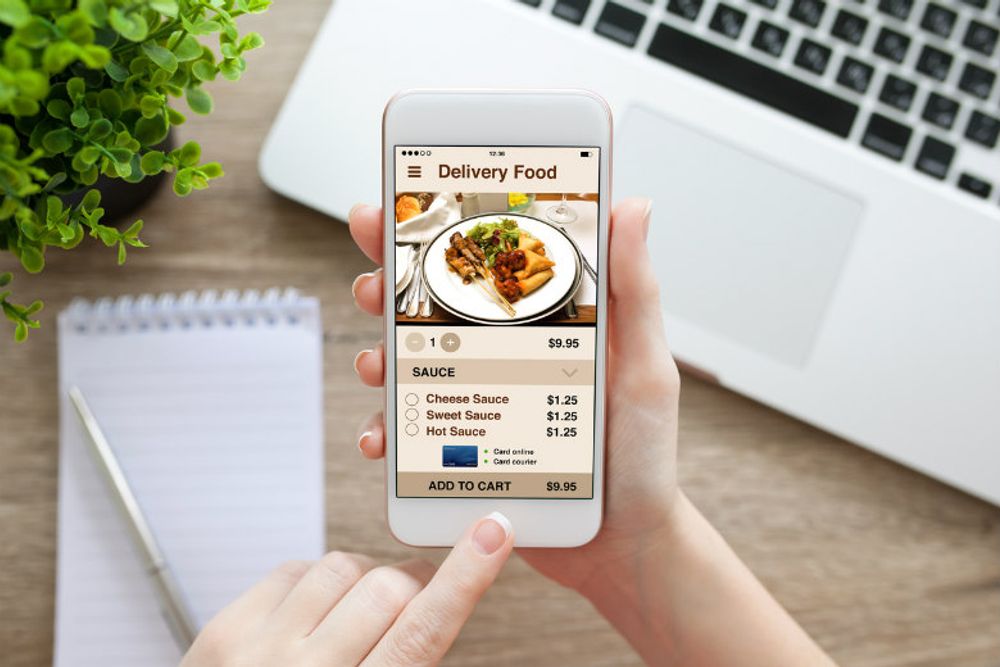
Demand for home delivery has made online shopping a must now for a fifth of the UK population during lockdown
The UK’s online grocery sector has been recording festive-style sales during the weeks of the lockdown and these booming sales looks like continuing for some time to come as Global Data UK now claims the overall online food & grocery retail market will grow 25.5% in 2020. That is providing the major supermarket chains can keep up with demand and keep on providing more delivery slots.
Thomas Brereton, retail analyst at GlobalData, says a fifth of the UK population is now spending more on online groceries than usual, since the March 23 lockdown and because the major supermarkets have been able to increase delivery options, online sales continue to rise. Sainsbury’s has now increased its slots by 50% and Tesco claims to be up to 1m deliveries a week.
“As a result, the online grocery market is now forecast to grow 25.5% in 2020 – significantly ahead of the 8.5% previously anticipated. On top of the initial increase in volume demand (c.30% in April), a continued reluctance to venture to stores for the rest of the year will bolster online market growth over a longer period than in-store,” adds Bereton.
Kantar sees slowdown in overall grocery food and drink shopping but also a boom in online
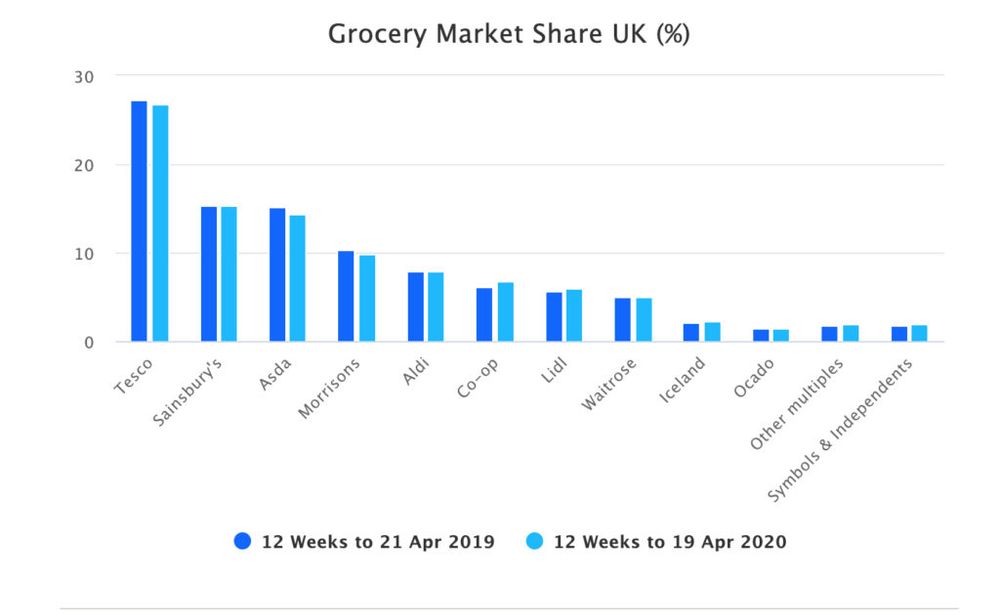
Kantar reports “take home grocery sales in Britain increased by 9.1% in the 12 weeks to April 19” but the year-on-year grocery market growth of 5.5% over the past four weeks is noticeably slower than the 20.6% recorded in March. Grocery sales in April were £524m higher than they were in April 2019, a sizeable increase.
It has identified a number of changing trends:
- the number of lunches eaten at home has nearly doubled under lockdown.
- On average, households shopped only 14 times for groceries over the past month, a record low and down from 17 in more normal times.
- But average spends are up to £26.02 per trip – by far the highest figure ever recorded by Kantar and £7 greater than last year.
- public appreciation of staff working on shop floors and tills reached record levels in April and was 13% higher than before the crisis started.
- Kantar says online customers have gone up 25% in April and online sales now account for 10.2% of overall grocery, versus 7.4% last month.
- over-65s spent 94% more on deliveries than they did a year ago.
- Convenience stores increased sales by 39% in April and now account for 16.3% of the market compared to 12.4% a year ago.
#RaiseTheBar campaign calls for rates grant relief
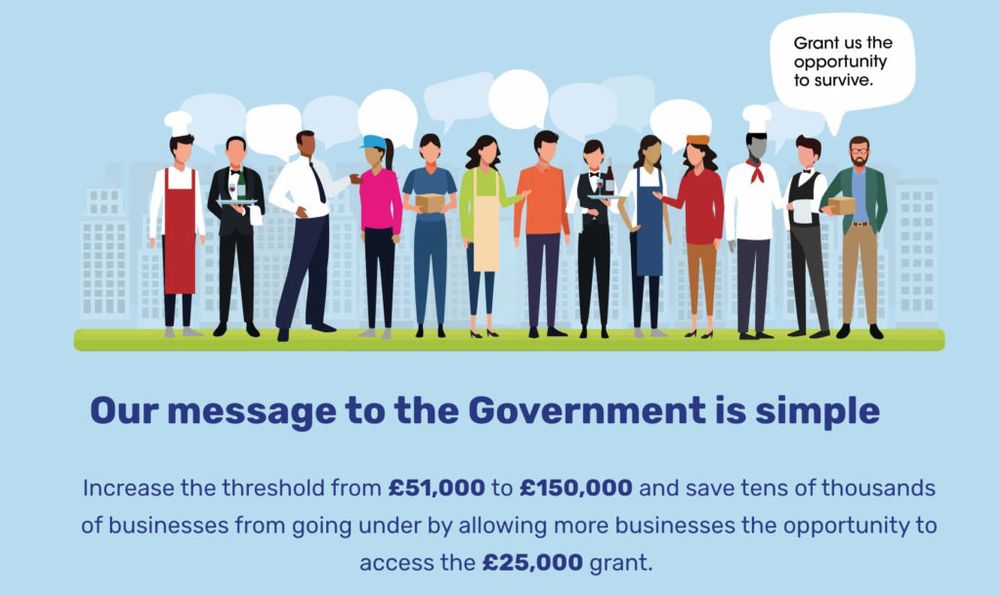
#RaiseTheBar campaign is focused 100% on rates relief support
The #RaiseTheBar campaign is the latest industry lobbying initiative that is calling for more urgent financial support to help hospitality and restaurant businesses before they asked to pay their next quarterly rent bills on June 24.
It is demanding the qualifying rules for businesses to receive £25k under the Retail Hospitality and Leisure Grant are urgently relaxed. It claims nearly 55,000 businesses across England and Wales are currently unable to access the funds and that local authorities should be given more than the £617m ‘discretionary fund’ so far handed out. It calculates £1.36 bn is needed to help the businesses that fall outside current support parameters, because their business rates fall between £51k and £150k a year.
There is now an ‘eight-week countdown’ before hospitality and retail businesses have to pay their next quarter rent bills, and unless moves are taken to suspend rent bills, many could go out of business. The #RaiseTheBar campaign has been backed by 86 MPS, across all parties, who wrote a letter to the Chancellor on May 1 calling for the business rates threshold to be increased.
Matthew Sims, chief executive of Croydon BID and co-founder of #RaiseTheBar campaign said: “Access to the RHLG grant is a ticking time bomb for tens of thousands of businesses on our high streets and in our local communities. There are just eight weeks until rent is due and the prospect of going under is an uncomfortable truth the government needs to hear and act upon now. The consequences of failing to increase the business rates threshold are too grim to bear.”
Richard Burge, chief executive of London Chamber of Commerce and Industry, said the “£51,000 national cap on business rates relief grant penalises many small, and independent businesses in the capital simply because of the high land values in London”.
Furlough rents scheme proposed
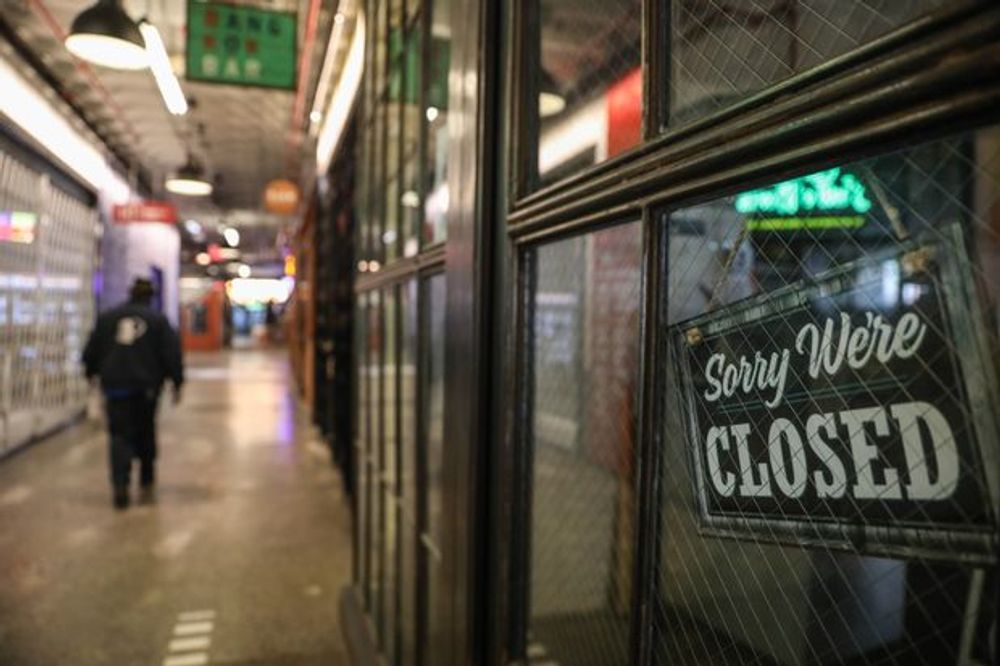
The government is said to be considering a furlough-type scheme for business landlords
Talks are also taking place between business leaders, landlords and the government about how the furlough scheme could be adapted to help pay the business rents that are due by the end of June.
Commercial property owners are also lobbying the government for a solution that helps keeps companies in business, but also means they don’t also go unpaid. The Telegraph claim a scheme is being planned that models one successfully introduced in Denmark. “Tenants would contribute some rent, landlords would agree to a reduction in payments and the Treasury would contribute money to help fill the gap,” it says.
This partnership approach would be targeted at helping the most vulnerable rented properties and then on a “sliding scale” of support, says the report.
Melanie Leech, chief executive of the British Property Federation, the largest property industry body, said: “The government is considering it seriously. The conversation is about how you best fill that gap rather than not recognising that there is a gap.”
A Treasury spokesman is quoted as saying officials “recognise the current challenges facing commercial landlords and the significant impact recent changes are having on their business models”.
FCA steps up actions against insurance companies not paying out on business insurance
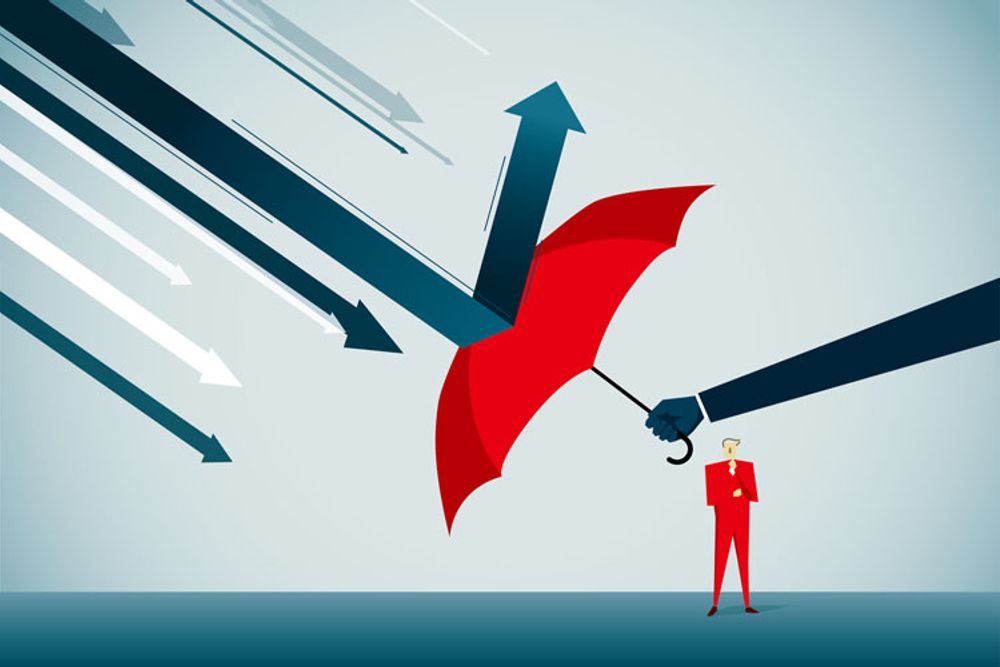
Businesses that thought they were covered are not getting the insurance payments they expected
As hundreds of hospitality business complain they have been turned down for insurance cover as a result of Covid-19, the Financial Conduct Authority has stepped in to try and force insurance companies to pay out.
It announced on Friday that it intends to get “a court declaration” that will ensure more payments are made under business interruption (BI) insurance cover. “This is due to continuing and widespread concerns about the lack of clarity and certainty for some customers making business interruption claims, and the basis on which some firms are making decisions in relation to claims,” it said in a statement.
“We are intending to take this action in the public interest to advance our consumer protection and market integrity objectives. We believe the circumstances of the current coronavirus (Covid-19) emergency, and its effect on businesses holding BI policies means that any uncertainty needs to be resolved as quickly as possible.”
“It is clear that decisive action is appropriate given the severity of the potential consequences for customers in the current coronavirus emergency.”
- Night Time Industries Association (NTIA) is working with and behalf of over 200 businesses, including hospitality firms, to take action against Hiscox, one of the UK’s biggest lenders of businesses interruption insurance. The Hiscox Action Group , which is fighting to compel Hiscox to honour its business interruption insurance claims.
- The British Beer & Pub Association also claims none of its members have received insurance payments. f the member companies surveyed that have claimed. It says 56% of applications have been rejected, while 44% are still undecided. await an outcome, which 67% of applications for pandemic cover have been rejected, with 33% still to be decided.
Louis Latour Agencies winemaker videos

Over the past few weeks of lockdown Louis Latour Agencies has been carrying out a series of interviews and chats with some of its partner wineries around the world, sharing their stories and experiences with a specific focus on the winemakers and their approaches to making wine, sustainability and their current vintages.
You can catch up on them all at Louis Latour Agencies own YouTube channel. To watch them click here.
Coca-Cola’s tribute to mark International Workers’ Day
If you have got the Monday blues then this might help. Just over two minutes of uplifting images and stories from the creative team at Coca-Cola to mark and celebrate International Workers Day, which was actually on Friday. But we probably need more of of pick-me-up today. It’s also a reminder of all the good, the sharing, caring and great steps being people and businesses are taking to help everyone at this time – a spirit that hopefully can last beyond lockdown. (The film above is called ‘For the Human Race’ and was made by Merdeka LHS, Dentsu Group Malaysia, for Coca-Cola.)
California Wine Institute:Behind the Wines with Elaine Chukan Brown and Hardy Wallace, Dirty and Rowdy Family Winery

Hardy Wallace will be chatting to Elaine Chukan Brown tomorrow at 6pm in the UK
The California Wine Institute is to continue with its series of online interviews, hosted by wine writer and academic, Elaine Chukan Brown, looking at what drives different top Californian producers and how they are adapting their winemaking, or working with new varieties.
Next up is Hardy Wallace, owner and winemaker of Dirty and Rowdy Family Winery with special guest Steve Edmunds, winemaker and owner of Edmunds St. John. The 30 minute chat takes place on Zoom on May 5 at 6pm in the UK and 10am in California. You can register here to take part.
They will be talking about three featured wines: 2019 Dirty and Rowdy Familiar Mourvèdre; 2018 Dirty and Rowdy Shake Ridge Ranch Mourvèdre; and 2018 Edmunds St. John El Jaléo, Shake Ridge Ranch.
You can watch other interviews in the series, including Steve Matthiasson, Jasmine Hirsch, Rory Williams, and Jason Haas – on the Wine Institute’s YouTube channel. Next week’s guest on May 12 is Randall Grahm of Bonny Doon Vineyard.
Camden celebrates ‘Heroes’ across the NHS
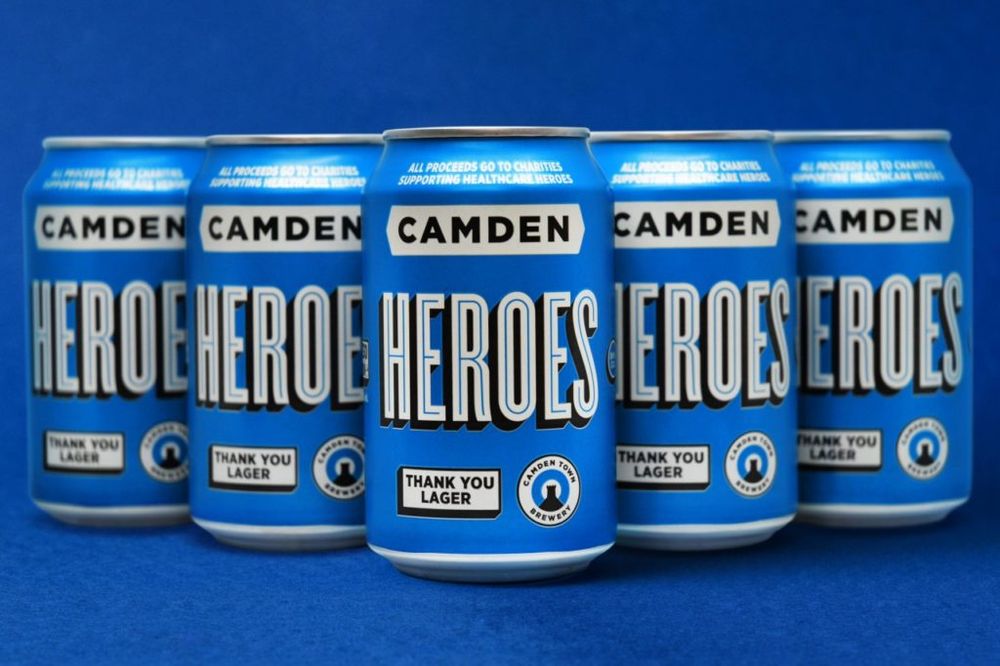
Camden has rebranded its Helles lager to support health workers
Camden Town Brewery has re-branded its Camden Hells lager to Camden Heroes, with all the proceeds of every can sold going to a range of charities supporting healthcare workers. NHS workers can also get a free six pack of Camden Heroes Lager through its Camden web shop. The brewery is also donating 20,000 cans directly to frontline staff at hospitals, ambulance stations and clinics in London as a direct ‘thank you’ for when staff clock off after their shift.
May 1
Why it’s consumer data that is persuading households brands to go DTC
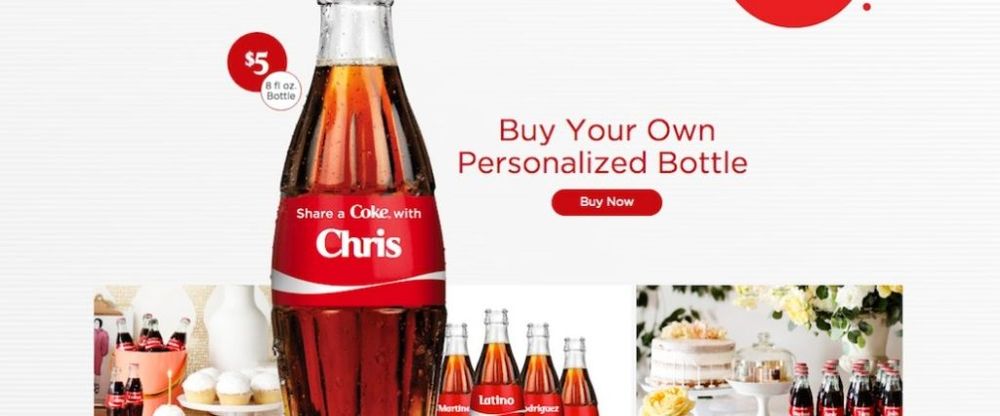
The biggest brands in the world are exploring the best way for them to go direct to consumer
Every day we are seeing new research and figures coming out that shows how fast the world of retailing and branding is going online and direct to consumer.
This week on The Buyer we have assessed why it is not just imperative for some 100% on-trade suppliers to switch to a DTC model in order to stay in business, but why it also makes sense longer term to have an omni channel strategy and not put all its eggs in the hospitality basket.
Major household drinks brands that do so much of their business through the on-trade, like soft drinks giants such as Coca-Cola, are also faced with the same dilemma. Do they go DTC too? And if so how do they make it work?
Some retail analysts believe the smart move for any major brand to take is to trial and set up some sort of DTC model and use it more for the direct data you get from the consumers that use it.
Andrew Lipsman, senior analyst at eMarketer, told Modern Retail this week that first “there’s no silver bullet for CPGs (consumer packaged goods).” But second it’s important brands start using DTC not to drive huge sales volume but because it will give them “those consumers’ first party data and they can use it for engagement, ad targeting and lookalike modelling — that’s the smart play”.
Now is the time to stop side stepping the issue and get on with it. “This is a moment in time when it would probably be smart to ramp up what they were planning to do,” he added.
Old ways could soon be the wrong ways
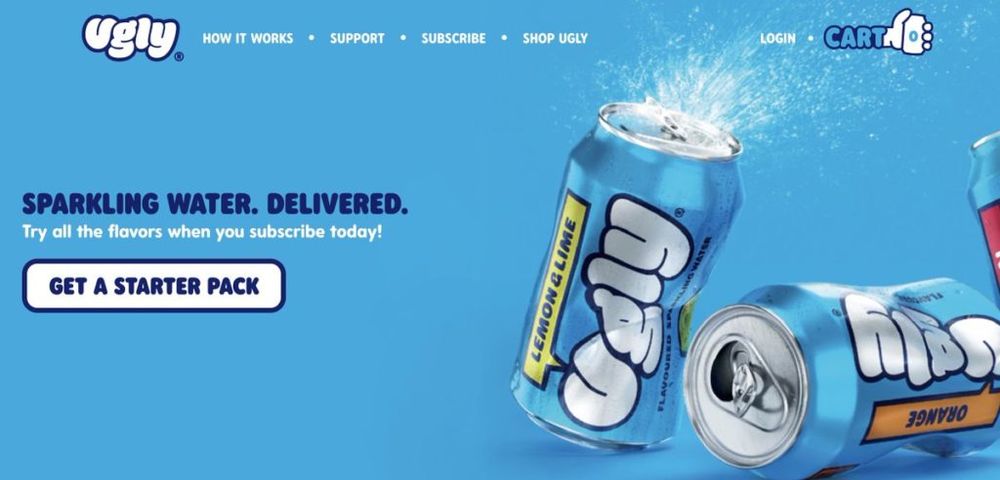
Ugly Drinks has made its name with a growing loyal consumer base by going DTC as well as having retail distribution
Barb Renner vice chairman of consumer products at Deloitte, said the huge losses big brands are now losing from the on-trade lockdown – half of Coca-Cola’s sales are said to come from hospitality and events venues – means the old ways of doing things is fast becoming the wrong way. If you rely on making the majority of your sales through big consumer venues and high traffic areas then it makes sense to at least start trialling direct online alternatives.
“There have been a lot of CPG companies that have been getting into digital incrementally,” said Renner. Those brands “are going to see this as a transformation phase… Everyone is talking digital.”
Ugly Drinks, the seltzer brand, has seen an increase of 400% going DTC in the UK and 200% in the US. “We see this as a validation of what we’ve seen for the past two, three years,” Ugly’s co-founder Hugh Thomas told Modern Retail. “I do believe you need to be omnichannel in 2020 and beyond. When one channel closes, have other things available.”
Laura Catena video interview: why partnerships and relationships are even more important in these times
Watch this video, produced for VINEX, the global trading site for bottled and bulk wine, with Laura Catena, managing director of Catena Zapata in Argentina, in which she talks about the changes it has made as a business to keep on producing, shipping and selling wine around the world. Catena looks back on the 2020 vintage, which she claims is one of Argentina’s best, and how she and her international team are working hard to find solutions and work closely with all its customers around the world, including those in the on-trade unable to operate.
How FTSE 100 chief executives are steering their businesses through Covid-19
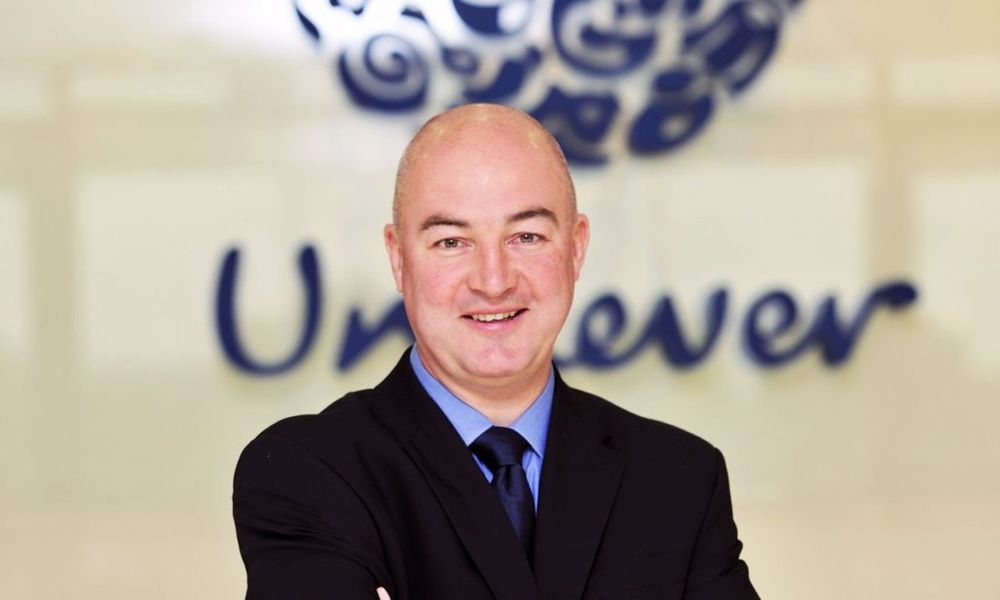
Alan Jope: Unilever’s chief executive says crisis management is all about people, supply chain, demand and cash
In a time of crisis we all look to our leaders to stand up and take the right action for our companies and our industry. But what actually does that mean in practice? We have been able to get glimpses and insights into how our drinks, retail and hospitality chiefs have responded to Covid-19, but what about those tasked with managing multi-national businesses through this crisis.
Like Unilever, that not only operates in virtually every major country in the world, but produces health and beauty products that we are actually relying on to use.
Its chief executive, the very engaging Alan Jope, told The Economist this week that he has four guiding principles: look after people; look after supply; look after demand; look after cash.
To do that has meant speeding everything up within its business, particularly in how it reports and acts on real time data and sales. So rather than run monthly sales forecasts it now does weekly ones. With such vital products to supply it can not risk any part of its supply chain not working 100%.
Paying suppliers
It has therefore looked to speed up payment to small and medium-sized suppliers, made €500m available as cashflow relief to its suppliers and customers, and offered credit to small retailers that rely on Unilever.
Jope is particularly keen to see other major company chief execs do the same and pay their suppliers more quickly, particularly for those smaller companies whose future’s rely on extremely tight cash flow. Any cost cutting to squeeze ever more efficiencies through its supply chain have been put on hold for now as the focus has switched just to make sure it works.
To do that has also meant prioritising and pushing human resources, supply chain and operations chiefs higher up the day to day strategising for the company, said Jope. As well as ensuring his country heads are completely on top of their briefs, including negotiating directly with government officials about how to keep products and supply chains moving.
Internal communication is also critical, Jope told The Economist. “One day strategic opportunities will resurface. But right now is not the time for distractions,” he concludes.
All about ‘holding’ your company and staff

A dictatorial, do it or else type management style is not going to cut it – particularly in a crisis. Staff want re-assurance and support
Gianpiero Petriglieri of The Harvard Business Review has also given his assessment of what he sees as a good business chief in a crisis. Yes, you need a vision on how you are going to respond and take the company forwards, but it believes it is much more about the softer, people skills of teamwork, and creating a sense of corporate togetherness is far more effective than thumping tables and sharing ‘visions’.
Instead the focus for a leader should all be about ‘holding’ – and how you interpret a bad, and difficult situation and then have the ability to reassure and help those in your business “make sense of a confusing predicament”.
“A CEO who, in a severe downturn, reassures employees that the company has the resources to weather the storm and most jobs will be protected, helps them interpret revenue data, and gives clear directions about what must be done to service existing clients and develop new business. That executive is holding,” says Petriglieri in the Harvard Business Review. “They think clearly, offer reassurance, orient people and help them stick together. That work is as important as inspiring others. In fact, it is a precondition for doing so.”
The key for how a business leader should behave in a crisis such as this is to do all they can to “put in place policies and procedures that reassure people about their job security or how fairly the organisation is treating them”.
Ensure any decisions being made allow the staff to be involved, to participate as it will help them adapt quicker, rather than end up with polarised factions. “For leaders in executive positions, this is the most impactful way of holding people in a crisis,” he writes.
“Tell your people what will happen to their salaries, health insurance, and working conditions. What will change about how they do their work? What are the key priorities now? Who needs to do what? You might not be able to make predictions, but you can still offer informed interpretations,” he adds.
Fiinally. Try this on for size: “People never forget how managers treated them when they were facing loss. And we will remember how our institutions, managers, and peers, held us through this crisis — or failed to.”
How US consumers are also uneasy about returning to restaurants post lockdown
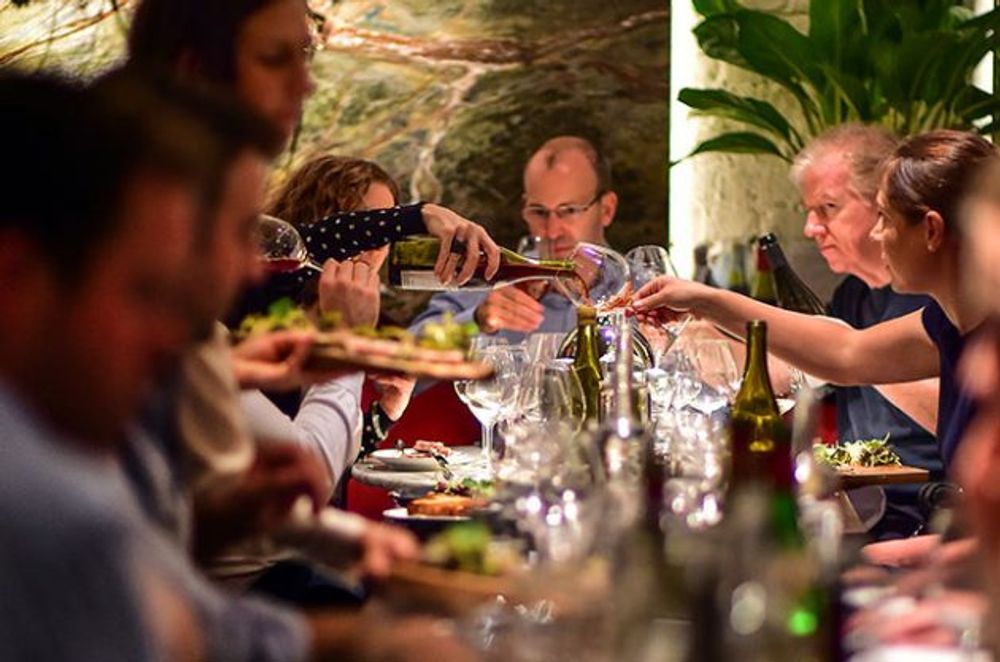
Americans are uneasy about going back to scenes like this is in a restaurant near them
Nielsen/ CGA’s latest data for the on-trade in the US shows the overall market was down 68% for the week ending April 25, compared to 75% for the first week in April. The trend for people to buy direct from restaurants for delivery is on the rise – increasing from 9% in the two weeks ending April 11 to 14% of US consumers having ordered a take out/delivery that included alcohol. The figure is even higher amongst 21-34 year olds, with 28% having ordered a take out/delivery with alcoholic drinks over the two weeks compared to 18%.
US consumers are similar to the UK in their reluctance to rush back to restaurants and bars once the lockdown restrictions are lifted.
- 72% said they would not return even if venues demonstrate they can show they have social distancing measures;
- this rises to 77% if the number of Covid-19 cases start to increase again.
- only 22% said they would return as soon as outlets reopen.
- 27% of consumers report they are drinking in lockdown versus 22% who are drinking less.
- the top things consumers want to see in venues when they reopen:
is to have fewer tables or customers so that safe social distancing can work (50%). - additional hygiene programs taking place in outlets (49%).
- take out/ delivery offerings are still available (41%).
There is some longer term encouragement in that 53% of consumers said they planned to eat (53%) and drink (50%) out the same or more often than pre-Covid-19 once we are completely out of lockdown.
US sommeliers fund supports over 300 colleagues

Chris Blanchard MS helped set up the United Sommeliers Foundation
The United Sommeliers Foundation (USF), which was set up a month ago as a nonprofit body to provide assistance to out-of-work wine professionals, has already been able to give 330 sommeliers financial grants to assist them with their every day expenses. The money has come from an initial $200,000 of donated funds, including $100,000 from Kobrand Wine & Spirits.
“In just over a month we’ve gone from a late night idea hatched at the beginning of the crisis to help our fellow sommeliers to pay rent and buy groceries, to a recognised charity organisation across the United States sending funds to these specific people who no longer have jobs and are desperate to make it through an uncertain future,” says Chris Blanchard, MS, co-founder of the body.
USF has received the full backing of the Court of Master Sommeliers. Its next major fund raising event is a fine-wine auction hosted by Acker Wines. It will include wines donated by major wineries, distributors and private collectors globally.
To apply for aid, donate, or learn more, please visit www.unitedsommeliersfoundation.org.
- If you have any news, views or ways in which you and your business are responding to the Covid-19 crisis and would like to share it on The Buyer’s rolling hub then contact Richard Siddle on richardsiddle@btopenworld.com.




